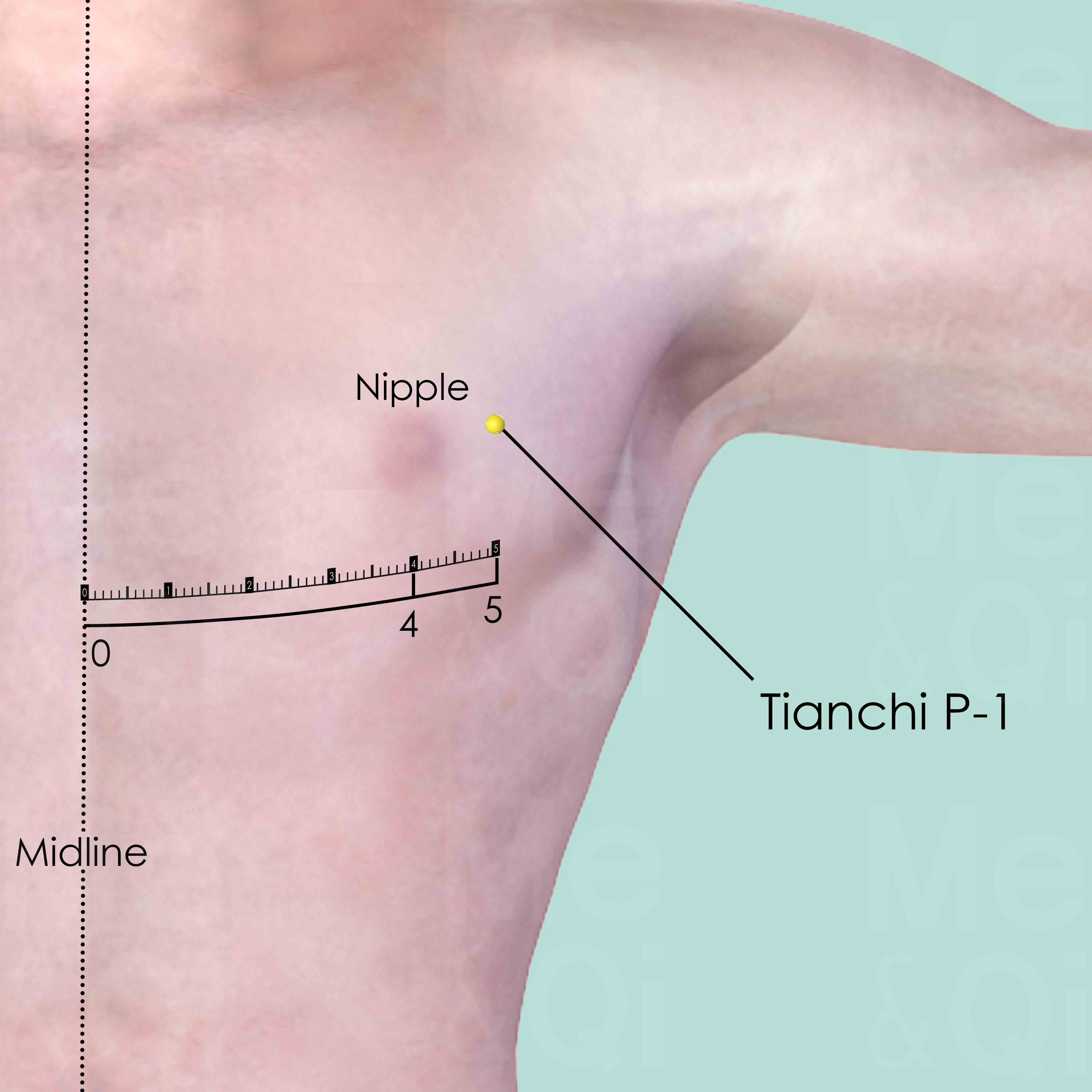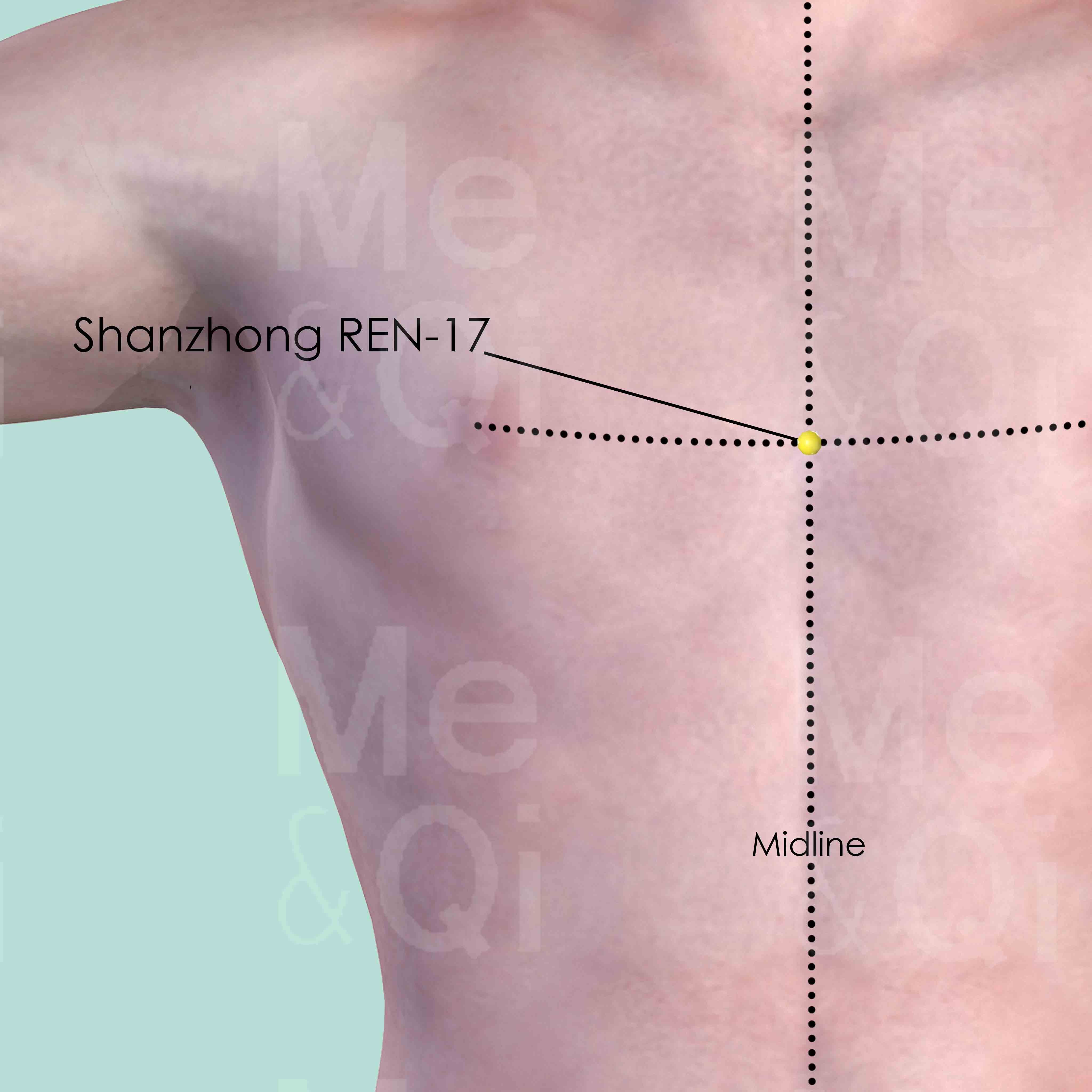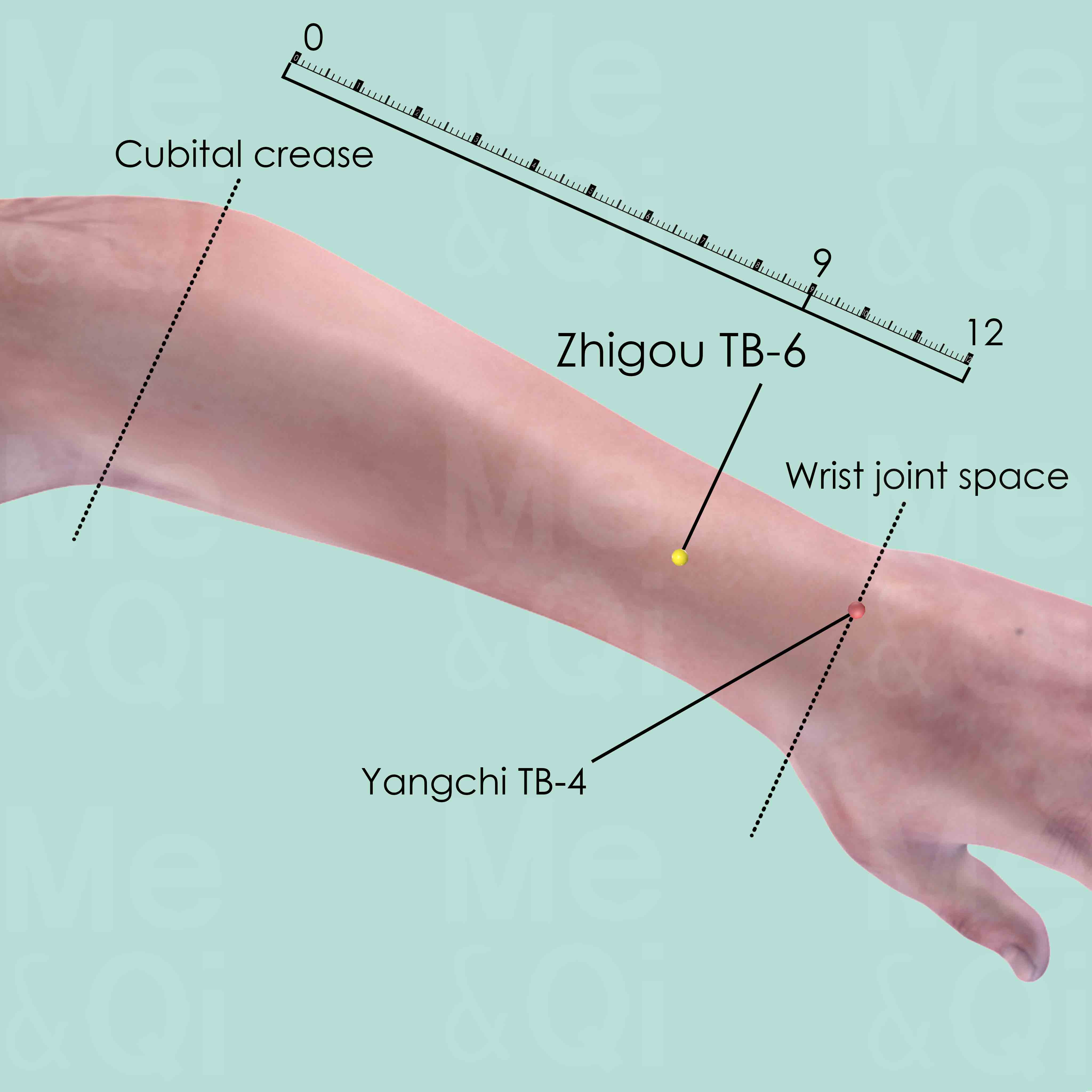Stifling Sensation In The Chestaccording to TCM
Symptom families: Chest Discomfort & Sensations, Chest & Hypochondriac Pain and Distention
Did you mean? Chest Distension
Root Causes of Stifling Sensation In The Chest in TCM
Explore below more details about what might cause Stifling sensation in the chest according to TCM.
- By Syndrome
- By Organ
- Phlegm
- Heat
- Qi Stagnation
- Dampness
- Blood Stasis
- Mind Disturbance
- Cold
- Wind
- Dryness
- Summer Heat
- View More Causes
- Lung
- Heart
- Pericardium
- Liver
- Stomach
- Spleen
- Uterus
- Gallbladder
- View More Organs
Phlegm
In TCM "Phlegm" as a pattern of disharmony is a complex concept that extends beyond the physical manifestation of mucus. It represents a pathological factor that can disrupt the flow of Qi (vital energy) and blood, leading to various health issues. Phlegm in TCM is seen as a sticky, turbid substance arising from the body's inability to metabolize fluids properly, often due to a dysfunction of the spleen. It's not only associated with respiratory problems like cough and congestion but also with systemic issues. Symptoms can include a feeling of heaviness, mental cloudiness, dizziness, and in some cases, the formation of lumps or masses. Phlegm can even be "invisible," contributing to emotional disturbances like depression or stress. ... see more
Phlegm Patterns That Can Lead to Stifling Sensation In The Chest
Common Symptoms: Dizziness Sputum Feeling Of Heaviness Depression Nausea Coughing Chest Distension Shortness Of Breath
| Pattern Name | Relevant Symptoms | Relevant Formulas |
|---|---|---|
| Qi-Phlegm | A feeling of oppression in chest and epigastrium, Globus sensation, Dysphagia, Upper abdominal oppression, Irritability, Mood swings, Depression... see more | Ban Xia Hou Pu Tang |
| Cold-Phlegm | Feeling of oppression of the chest, White and watery sputum, Cold extremities, Nausea, Lack of appetite | Ling Gan Wu Wei Jiang Xin Tang | San Zi Yang Qin Tang |
| Cold-Phlegm in the Lungs | Feeling of oppression of the chest, Coughing, White and watery sputum, Chills, Cold hands, Sputum, Dizziness, Feeling of heaviness... see more | Ling Gan Wu Wei Jiang Xin Tang | San Zi Yang Qin Tang | Ling Gui Zhu Gan Tang |
| Damp-Phlegm in the Uterus | Feeling of oppression of the chest, Late menstruation, Amenorrhea, Scanty menstruation, Lower abdominal pain, Abdominal heaviness, Generalized fatigue, Diarrhea, Dull pale complexion, Obesity, Infertility, Ovarian cysts, Ovarian fibroids, Polycystic ovary syndrome, Pseudocyesis, Sputum, Feeling of heaviness... see more | Cang Fu Dao Tan Wan | Wei Ling Tang | Wan Dai Tang | Xiong Gui Er Chen Tang |
| Phlegm | Feeling of oppression of the chest, Chest pressure, Head fog, Dizziness | Ling Gui Zhu Gan Tang | Er Chen Tang | Liu Jun Zi Tang | Ban Xia Bai Zhu Tian Ma Tang | Wen Dan Tang | Hao Qin Qing Dan Tang | Xing Su San | Xiao Ban Xia Tang |
| Phlegm Fire harassing the Pericardium | Feeling of oppression of the chest, Palpitations, Flushed face, Bitter taste in the mouth, Noisy breathing, Restlessness, Insomnia, Vivid dreaming, Anxiety, Incoherent or confused speech, Confusion, Rash behaviour, Uncontrolled laughing or crying, Verbal aggression, Talking to oneself, Depression, Dull shallow face, Aggression, Chest pain, Rapid respiration... see more | Wen Dan Tang | Huang Lian Wen Dan Tang | Zhi Bao Dan | Hui Chun Dan |
| Phlegm-Fire harassing the Heart | Feeling of oppression of the chest, Palpitations, Flushed face, Bitter taste in the mouth, Noisy breathing, Restlessness, Insomnia, Vivid dreaming, Anxiety, Incoherent or confused speech, Confusion, Rash behaviour, Uncontrolled laughing or crying, Verbal aggression, Talking to oneself, Depression, Dull shallow face, Aggression... see more | Wen Dan Tang | Huang Lian Wen Dan Tang | Sheng Tie Luo Yin |
| Phlegm-Fluids above the diaphragm | Feeling of oppression of the chest, Stifling sensation in the chest, Coughing, Asthma, Edema, Dizziness, Profuse white sputum | Ling Gan Wu Wei Jiang Xin Tang | Xiao Qing Long Tang |
| Phlegm-Heat | Feeling of oppression of the chest, Upper abdominal oppression, Mucous in feces, Depression | Wen Dan Tang | Ding Chuan Tang | Qing Qi Hua Tan Wan | Gun Tan Wan |
| Wind-Phlegm | Feeling of oppression of the chest, Stifling sensation in the chest, Dizziness, Aphasia, Coughing and wheezing with copious sputum, Noisy breathing, Limb numbness... see more | Ban Xia Bai Zhu Tian Ma Tang |
| Damp-Phlegm in the Lungs | Stifling sensation in the chest, Coughing, Pale face, Sputum, Shortness of breath, Discomfort when lying down, Wheezing, Nausea, Feeling of heaviness, Dizziness, Profuse white sputum, Asthma, Chest distension... see more | Er Chen Tang |
| Dry-Phlegm in the Lungs | Stifling sensation in the chest, Dry cough, Scanty sputum, Shortness of breath, Sputum, Feeling of heaviness, Dizziness, Dry throat, Wheezing, Pale face... see more | Bei Mu Gua Lou San |
| Phlegm in the Channels joints and muscles | Stifling sensation in the chest, Skin numbness, Skeletal deformities, Joint stiffness, Arthralgia, Muscle pain | Shen Tong Zhu Yu Tang |
| Phlegm-Fluids in the Lungs | Stifling sensation in the chest, Coughing, White and watery sputum, Shortness of breath, Gurgling noise in the chest, Feeling of heaviness, Dizziness, Chills, Cought with sticky phlegm, Itchy throat... see more | Ling Gan Wu Wei Jiang Xin Tang | Zhi Sou San |
| Phlegm-Heat in the Lungs | Stifling sensation in the chest, Coughing, Shortness of breath, Wheezing, Sputum, Feeling hot, Thirst, Head and body heaviness, Dizziness, Copious thick yellow sputum... see more | Er Chen Tang | Wen Dan Tang | Qing Qi Hua Tan Wan | Ma Xing Shi Gan Tang | Qing Xin Li Ge Tang | Ren Shen Ge Jie San | Pi Pa Qing Fei Yin |
Heat
In TCM "Heat" signifies an excess of Yang energy, leading to an imbalance where heat predominates over the body's cool Yin aspects. This condition is metaphorically akin to an internal over-heating. Symptoms indicative of Heat can include feelings of warmth, fever, sweating, irritability, red face, thirst with a preference for cold drinks, and a rapid pulse. The tongue may appear red with a yellow coating. Unlike the common interpretation of heat in terms of temperature, in TCM, it represents a state of hyperactivity or inflammation in the body.... see more
Heat Patterns That Can Lead to Stifling Sensation In The Chest
Common Symptoms: Thirst Bitter Taste In The Mouth Flushed Face Restlessness Insomnia Anxiety Depression Feeling Hot
| Pattern Name | Relevant Symptoms | Relevant Formulas |
|---|---|---|
| Damp-Heat in Stomach and Spleen | A feeling of oppression in chest and epigastrium, Head and body heaviness, Upper abdominal oppression, Nausea, Diarrhea, Fever not reduced by sweating... see more | Lian Po Yin | Ge Hua Jie Cheng San | Sheng Yang Yi Wei Tang |
| Phlegm Fire harassing the Pericardium | Feeling of oppression of the chest, Palpitations, Flushed face, Bitter taste in the mouth, Noisy breathing, Restlessness, Insomnia, Vivid dreaming, Anxiety, Incoherent or confused speech, Confusion, Rash behaviour, Uncontrolled laughing or crying, Verbal aggression, Talking to oneself, Depression, Dull shallow face, Aggression, Chest pain, Rapid respiration... see more | Wen Dan Tang | Huang Lian Wen Dan Tang | Zhi Bao Dan | Hui Chun Dan |
| Phlegm-Fire harassing the Heart | Feeling of oppression of the chest, Palpitations, Flushed face, Bitter taste in the mouth, Noisy breathing, Restlessness, Insomnia, Vivid dreaming, Anxiety, Incoherent or confused speech, Confusion, Rash behaviour, Uncontrolled laughing or crying, Verbal aggression, Talking to oneself, Depression, Dull shallow face, Aggression... see more | Wen Dan Tang | Huang Lian Wen Dan Tang | Sheng Tie Luo Yin |
| Phlegm-Heat | Feeling of oppression of the chest, Upper abdominal oppression, Mucous in feces, Depression | Wen Dan Tang | Ding Chuan Tang | Qing Qi Hua Tan Wan | Gun Tan Wan |
| Stagnant Liver Qi turning into Fire | Feeling of oppression of the chest, Hypochondriac distention, Upper abdominal distension, Irritability, Melancholia, Depression, Mood swings, Globus sensation, Feeling hot, Flushed face, Thirst, Anger, Pre menstrual tension, Irregular periods, Pre menstrual breast distension, Excessive menstruation... see more | Dan Zhi Xiao Yao San |
| Early Stage Summerheat with Exterior Wind-Cold | Stifling sensation in the chest, Fever, Chills, Lack of sweating, Headaches, Thirst, Flushed face, Feeling of heaviness, Body pain, Dark urine, Urinary dysfunction... see more | Xin Jia Xiang Ru Yin |
| Pericardium Fire | Stifling sensation in the chest, Palpitations, Bitter taste in the mouth, Insomnia, Thirst, Mouth ulcers, Tongue ulcers, Cardiac burning sensation, Rapid respiration, Restlessness, Anxiety, Feeling hot, Vivid dreaming, Excessive menstruation... see more | Xie Xin Tang | Zi Xue Dan |
| Phlegm-Heat in the Lungs | Stifling sensation in the chest, Coughing, Shortness of breath, Wheezing, Sputum, Feeling hot, Thirst, Head and body heaviness, Dizziness, Copious thick yellow sputum... see more | Er Chen Tang | Wen Dan Tang | Qing Qi Hua Tan Wan | Ma Xing Shi Gan Tang | Qing Xin Li Ge Tang | Ren Shen Ge Jie San | Pi Pa Qing Fei Yin |
| Damp-Heat | Chest pressure, Fever, Neck gland swelling, Headaches, Tight feeling in chest and stomach, Sticky taste in the mouth, Absence of thirst, Feeling hot, Feeling of heaviness, Bitter taste in the mouth, Acne... see more | Ba Zheng San |
| Heat in Gall Bladder | Stifling sensation in the chest, Mild chills with high fever, Bitter taste in the mouth, Vomiting of sour fluids, Thirst, Hypochondriac pain and discomfort, Nausea, Upper abdominal fullness, Cholecystitis, Icteric hepatitis, Kidney infection... see more | Hao Qin Qing Dan Tang |
Qi Stagnation
Qi Stagnation in TCM is like having a traffic jam in your body's energy system. Qi, the vital life force that flows through your body, is supposed to move smoothly to maintain health and balance. But with Qi Stagnation, this flow gets blocked or slowed down, like cars stuck on a highway. This can lead to symptoms like feeling stressed, emotional mood swings, and physical discomfort, often described as a feeling of fullness or tightness, especially in the chest or abdomen. It's as though the body's internal energy circulation is disrupted, causing various issues. TCM sees this as an energy flow problem, different from modern medicine's focus on specific physiological processes.... see more
Qi Stagnation Patterns That Can Lead to Stifling Sensation In The Chest
Common Symptoms: Depression Irritability Globus Sensation Mood Swings Sighing Lack Of Appetite Chest Distension Throat Lumps
| Pattern Name | Relevant Symptoms | Relevant Formulas |
|---|---|---|
| Qi-Phlegm | A feeling of oppression in chest and epigastrium, Globus sensation, Dysphagia, Upper abdominal oppression, Irritability, Mood swings, Depression... see more | Ban Xia Hou Pu Tang |
| Heart Qi Stagnation | Feeling of oppression of the chest, Palpitations, Chest distension, Depression | Ban Xia Hou Pu Tang |
| Qi Stagnation | Feeling of oppression of the chest, General fullness, Moving pain, Depression, Irritability, Mood swings, Sighing | Chai Hu Shu Gan San | Xiao Yao San | Si Mo Tang | Qi Ge San |
| Stagnant Liver Qi turning into Fire | Feeling of oppression of the chest, Hypochondriac distention, Upper abdominal distension, Irritability, Melancholia, Depression, Mood swings, Globus sensation, Feeling hot, Flushed face, Thirst, Anger, Pre menstrual tension, Irregular periods, Pre menstrual breast distension, Excessive menstruation... see more | Dan Zhi Xiao Yao San |
| Pericardium Qi Stagnation | Stifling sensation in the chest, Mild chest pain, Chest distension, Sighing, Throat lumps, Palpitations, Depression, Irritability, Lack of appetite, Weak limbs, Cold extremities... see more | Ban Xia Hou Pu Tang |
| Liver Qi Stagnation | Stifling sensation in the chest causing one to have deep sighs, Hypochondriac distention, Chest distension, Upper abdominal distension, Abdominal distention, Sighing, Melancholia, Depression, Mood swings, Irregular periods, Globus sensation, Pre menstrual breast distension, Pre menstrual tension, Anxiety, Anger... see more | Chai Hu Shu Gan San |
Dampness
"Dampness" in TCM is a concept that describes a pattern of disharmony where the body accumulates excess moisture. Imagine the heavy, sticky feeling you get on a very humid day; that's similar to what dampness feels like internally. It can manifest as a sense of heaviness, bloating, sluggishness, or even a foggy mind. This condition is often thought to arise from environmental factors like living in a damp place, dietary habits that promote moisture in the body, or internal imbalances that hinder the body's ability to process fluids properly. In TCM, dampness can obstruct the normal flow of energy and fluids in the body, leading to various symptoms.... see more
Dampness Patterns That Can Lead to Stifling Sensation In The Chest
Common Symptoms: Feeling Of Heaviness Nausea Diarrhea Dizziness Late Menstruation Lower Abdominal Pain Generalized Fatigue Sputum
| Pattern Name | Relevant Symptoms | Relevant Formulas |
|---|---|---|
| Damp-Heat in Stomach and Spleen | A feeling of oppression in chest and epigastrium, Head and body heaviness, Upper abdominal oppression, Nausea, Diarrhea, Fever not reduced by sweating... see more | Lian Po Yin | Ge Hua Jie Cheng San | Sheng Yang Yi Wei Tang |
| Damp-Phlegm in the Uterus | Feeling of oppression of the chest, Late menstruation, Amenorrhea, Scanty menstruation, Lower abdominal pain, Abdominal heaviness, Generalized fatigue, Diarrhea, Dull pale complexion, Obesity, Infertility, Ovarian cysts, Ovarian fibroids, Polycystic ovary syndrome, Pseudocyesis, Sputum, Feeling of heaviness... see more | Cang Fu Dao Tan Wan | Wei Ling Tang | Wan Dai Tang | Xiong Gui Er Chen Tang |
| Damp-Phlegm in the Lungs | Stifling sensation in the chest, Coughing, Pale face, Sputum, Shortness of breath, Discomfort when lying down, Wheezing, Nausea, Feeling of heaviness, Dizziness, Profuse white sputum, Asthma, Chest distension... see more | Er Chen Tang |
| Early Stage Summerheat with Exterior Wind-Cold | Stifling sensation in the chest, Fever, Chills, Lack of sweating, Headaches, Thirst, Flushed face, Feeling of heaviness, Body pain, Dark urine, Urinary dysfunction... see more | Xin Jia Xiang Ru Yin |
| Damp-Heat | Chest pressure, Fever, Neck gland swelling, Headaches, Tight feeling in chest and stomach, Sticky taste in the mouth, Absence of thirst, Feeling hot, Feeling of heaviness, Bitter taste in the mouth, Acne... see more | Ba Zheng San |
Blood Stasis
Blood Stasis in TCM is a concept where the blood flow in the body is not as smooth or efficient as it should be. Imagine a river that's supposed to flow freely, but instead, it's getting blocked or moving too slowly in some parts. This can lead to various health issues, like pain that feels sharp or stabbing, dark bruises, and a complexion that looks purplish. TCM believes that good health relies on the smooth and vibrant flow of Qi and blood throughout the body, so when blood gets stuck, it's like a traffic jam in your body, leading to discomfort or health problems.... see more
Blood Stasis Patterns That Can Lead to Stifling Sensation In The Chest
Common Symptoms: Palpitations Purple Lips Purple Nails Cold Hands Purple Face Shortness Of Breath Depression Chest Pain
| Pattern Name | Relevant Symptoms | Relevant Formulas |
|---|---|---|
| Heart Blood Stagnation | Chest constriction, Feeling of oppression of the chest, Stabbing chest pain | Xue Fu Zhu Yu Tang |
| Heart Vessel obstructed | Feeling of oppression of the chest, Palpitations, Shortness of breath, Depression, Restlessness, Heart pain, Chest pain, Sputum, Feeling of heaviness, Reluctance to speak, Cold extremities, Sighing, Purple lips, Purple nails, Purple face... see more | Xue Fu Zhu Yu Tang | Chai Hu Shu Gan San | Di Tan Tang | Dang Gui Si Ni Tang |
| Pericardium Blood Stagnation | Feeling of oppression of the chest, Stifling sensation in the chest, Palpitations, Chest pain, Chest distension, Shortness of breath, Purple lips, Purple nails, Menstrual cramps, Dark menstrual clots... see more | Xue Fu Zhu Yu Tang |
Mind Disturbance
In TCM "Shen" refers to the mind or spirit, and a Shen disturbance is a pattern of disharmony that affects the mental and emotional state. This concept reflects the TCM belief in the deep interconnectedness of mind and body. Symptoms of Shen disturbance can vary widely but often include anxiety, insomnia, restlessness, confusion, or in severe cases, hallucinations or delirium. These symptoms indicate an imbalance in the body's energies affecting the heart, which in TCM is not only the center of blood circulation but also the seat of the mind and consciousness. The root of Shen disturbance can be traced to various factors, including emotional stress, physical illness, or an imbalance in fundamental substances like Qi, Yin, or Yang.... see more
Mind Disturbance Patterns That Can Lead to Stifling Sensation In The Chest
Common Symptoms: Palpitations Flushed Face Bitter Taste In The Mouth Restlessness Insomnia Vivid Dreaming Anxiety Thirst
| Pattern Name | Relevant Symptoms | Relevant Formulas |
|---|---|---|
| Phlegm Fire harassing the Pericardium | Feeling of oppression of the chest, Palpitations, Flushed face, Bitter taste in the mouth, Noisy breathing, Restlessness, Insomnia, Vivid dreaming, Anxiety, Incoherent or confused speech, Confusion, Rash behaviour, Uncontrolled laughing or crying, Verbal aggression, Talking to oneself, Depression, Dull shallow face, Aggression, Chest pain, Rapid respiration... see more | Wen Dan Tang | Huang Lian Wen Dan Tang | Zhi Bao Dan | Hui Chun Dan |
| Phlegm-Fire harassing the Heart | Feeling of oppression of the chest, Palpitations, Flushed face, Bitter taste in the mouth, Noisy breathing, Restlessness, Insomnia, Vivid dreaming, Anxiety, Incoherent or confused speech, Confusion, Rash behaviour, Uncontrolled laughing or crying, Verbal aggression, Talking to oneself, Depression, Dull shallow face, Aggression... see more | Wen Dan Tang | Huang Lian Wen Dan Tang | Sheng Tie Luo Yin |
| Pericardium Fire | Stifling sensation in the chest, Palpitations, Bitter taste in the mouth, Insomnia, Thirst, Mouth ulcers, Tongue ulcers, Cardiac burning sensation, Rapid respiration, Restlessness, Anxiety, Feeling hot, Vivid dreaming, Excessive menstruation... see more | Xie Xin Tang | Zi Xue Dan |
Cold
In TCM "Cold" as a pattern of disharmony refers to a specific type of imbalance within the body's systems, often linked to a deficiency or weakness. It's not about feeling physically cold or having a common cold, but rather a metaphorical description of certain symptoms and underlying conditions. When a TCM practitioner says someone suffers from "Cold," it usually implies that the body's Yang energy, which is warm and active, is insufficient or overpowered by Yin energy, which is cool and passive. Symptoms of Cold in TCM can include a general feeling of coldness, cold limbs, pale complexion, low energy, slow metabolism, and a preference for warmth. ... see more
Cold Patterns That Can Lead to Stifling Sensation In The Chest
Common Symptoms: White And Watery Sputum Chills Feeling Of Heaviness Cold Extremities Nausea Lack Of Appetite Chronic Bronchitis Chronic Asthma
| Pattern Name | Relevant Symptoms | Relevant Formulas |
|---|---|---|
| Cold-Phlegm | Feeling of oppression of the chest, White and watery sputum, Cold extremities, Nausea, Lack of appetite | Ling Gan Wu Wei Jiang Xin Tang | San Zi Yang Qin Tang |
| Cold-Phlegm in the Lungs | Feeling of oppression of the chest, Coughing, White and watery sputum, Chills, Cold hands, Sputum, Dizziness, Feeling of heaviness... see more | Ling Gan Wu Wei Jiang Xin Tang | San Zi Yang Qin Tang | Ling Gui Zhu Gan Tang |
| Early Stage Summerheat with Exterior Wind-Cold | Stifling sensation in the chest, Fever, Chills, Lack of sweating, Headaches, Thirst, Flushed face, Feeling of heaviness, Body pain, Dark urine, Urinary dysfunction... see more | Xin Jia Xiang Ru Yin |
Wind
In TCM "Wind" is a concept that represents a pattern of disharmony, often characterized by its sudden and unpredictable nature, much like a gusty wind changing direction without warning. This pattern is associated with symptoms that come and go quickly or move around the body, such as itching, tremors, or even certain types of pain. Wind is considered to be a primary cause of illnesses that have these rapidly changing characteristics. In TCM, external Wind often refers to illnesses that start suddenly, like the common cold, believed to be caused by external pathogenic factors like climatic changes. On the other hand, internal Wind can be linked to internal imbalances and can manifest in conditions like dizziness or spasms. ... see more
Wind Patterns That Can Lead to Stifling Sensation In The Chest
Common Symptoms: Headaches Dizziness Aphasia Coughing And Wheezing With Copious Sputum Noisy Breathing Limb Numbness Itchy Ears Chest Pain
| Pattern Name | Relevant Symptoms | Relevant Formulas |
|---|---|---|
| Wind-Phlegm | Feeling of oppression of the chest, Stifling sensation in the chest, Dizziness, Aphasia, Coughing and wheezing with copious sputum, Noisy breathing, Limb numbness... see more | Ban Xia Bai Zhu Tian Ma Tang |
| Early Stage Summerheat with Exterior Wind-Cold | Stifling sensation in the chest, Fever, Chills, Lack of sweating, Headaches, Thirst, Flushed face, Feeling of heaviness, Body pain, Dark urine, Urinary dysfunction... see more | Xin Jia Xiang Ru Yin |
Dryness
"Dryness" in TCM refers to a state where there is a lack of moisture in the body, much like how the land feels during a drought. It's a pattern of disharmony that can arise from external factors like dry weather or internal issues, such as insufficient fluid intake or certain lifestyle habits. When your body experiences this dryness, you might notice symptoms like dry skin, a scratchy throat, dry eyes, or even constipation. It's similar to the feeling of being parched or having dry, chapped lips in a very dry climate. TCM views this as an imbalance where the body's yin - often associated with moisture and cooling - is depleted.... see more
Dryness Patterns That Can Lead to Stifling Sensation In The Chest
| Pattern Name | Relevant Symptoms | Relevant Formulas |
|---|---|---|
| Dry-Phlegm in the Lungs | Stifling sensation in the chest, Dry cough, Scanty sputum, Shortness of breath, Sputum, Feeling of heaviness, Dizziness, Dry throat, Wheezing, Pale face... see more | Bei Mu Gua Lou San |
Summer Heat
"Summer-Heat" in TCM is a unique concept that refers to a pattern of disharmony often associated with the hot summer months. Imagine the intense heat of summer stressing your body, like being in a sweltering, humid environment for too long. This can lead to symptoms like feeling overheated, excessive sweating, a feeling of irritation, and sometimes even nausea or dizziness. In TCM, this condition is thought to arise from the external environment's heat affecting the body's internal balance. It's similar to how we might feel uncomfortable and out of sorts on a very hot day. ... see more
Summer Heat Patterns That Can Lead to Stifling Sensation In The Chest
| Pattern Name | Relevant Symptoms | Relevant Formulas |
|---|---|---|
| Early Stage Summerheat with Exterior Wind-Cold | Stifling sensation in the chest, Fever, Chills, Lack of sweating, Headaches, Thirst, Flushed face, Feeling of heaviness, Body pain, Dark urine, Urinary dysfunction... see more | Xin Jia Xiang Ru Yin |
Lung
In TCM the Lungs are seen as the organ responsible for controlling Qi and respiration, as well as being a key part of the body's defensive system. They are thought to maintain the balance and flow of air and moisture, and are closely linked to the skin and hair. When the Lungs are imbalanced or malfunctioning in TCM, it can lead to respiratory issues like coughing or asthma, a weakened immune system, dry skin, and emotional disturbances such as sadness or grief. These symptoms are believed to arise from disruptions in the Lungs' ability to regulate Qi and protect the body, highlighting their central role in maintaining overall health and well-being.... see more
Lung Patterns That Can Lead to Stifling Sensation In The Chest
Common Symptoms: Dizziness Coughing Sputum Feeling Of Heaviness Shortness Of Breath Wheezing White And Watery Sputum Chills
| Pattern Name | Relevant Symptoms | Relevant Formulas |
|---|---|---|
| Cold-Phlegm in the Lungs | Feeling of oppression of the chest, Coughing, White and watery sputum, Chills, Cold hands, Sputum, Dizziness, Feeling of heaviness... see more | Ling Gan Wu Wei Jiang Xin Tang | San Zi Yang Qin Tang | Ling Gui Zhu Gan Tang |
| Damp-Phlegm in the Lungs | Stifling sensation in the chest, Coughing, Pale face, Sputum, Shortness of breath, Discomfort when lying down, Wheezing, Nausea, Feeling of heaviness, Dizziness, Profuse white sputum, Asthma, Chest distension... see more | Er Chen Tang |
| Dry-Phlegm in the Lungs | Stifling sensation in the chest, Dry cough, Scanty sputum, Shortness of breath, Sputum, Feeling of heaviness, Dizziness, Dry throat, Wheezing, Pale face... see more | Bei Mu Gua Lou San |
| Phlegm-Fluids in the Lungs | Stifling sensation in the chest, Coughing, White and watery sputum, Shortness of breath, Gurgling noise in the chest, Feeling of heaviness, Dizziness, Chills, Cought with sticky phlegm, Itchy throat... see more | Ling Gan Wu Wei Jiang Xin Tang | Zhi Sou San |
| Phlegm-Heat in the Lungs | Stifling sensation in the chest, Coughing, Shortness of breath, Wheezing, Sputum, Feeling hot, Thirst, Head and body heaviness, Dizziness, Copious thick yellow sputum... see more | Er Chen Tang | Wen Dan Tang | Qing Qi Hua Tan Wan | Ma Xing Shi Gan Tang | Qing Xin Li Ge Tang | Ren Shen Ge Jie San | Pi Pa Qing Fei Yin |
Heart
In TCM the Heart is considered the "emperor" of all organs, primarily responsible for governing Blood and housing the mind, known as "Shen." It plays a crucial role in maintaining mental-emotional equilibrium and controlling the circulation of Qi and blood throughout the body. When the Heart is imbalanced or malfunctions in TCM, it can lead to a range of issues like heart palpitations, insomnia, dream-disturbed sleep, anxiety, and a flushed complexion. Emotional disturbances such as excessive joy or lack of joy are also seen as signs of Heart disharmony. These symptoms reflect not just physical heart conditions but also the state of one's Shen, indicating the interconnectedness of physical and emotional well-being in TCM.... see more
Heart Patterns That Can Lead to Stifling Sensation In The Chest
Common Symptoms: Palpitations Purple Lips Depression Purple Nails Purple Face Aggression Shortness Of Breath Sighing
| Pattern Name | Relevant Symptoms | Relevant Formulas |
|---|---|---|
| Heart Blood Stagnation | Chest constriction, Feeling of oppression of the chest, Stabbing chest pain | Xue Fu Zhu Yu Tang |
| Heart Qi Stagnation | Feeling of oppression of the chest, Palpitations, Chest distension, Depression | Ban Xia Hou Pu Tang |
| Heart Vessel obstructed | Feeling of oppression of the chest, Palpitations, Shortness of breath, Depression, Restlessness, Heart pain, Chest pain, Sputum, Feeling of heaviness, Reluctance to speak, Cold extremities, Sighing, Purple lips, Purple nails, Purple face... see more | Xue Fu Zhu Yu Tang | Chai Hu Shu Gan San | Di Tan Tang | Dang Gui Si Ni Tang |
| Phlegm-Fire harassing the Heart | Feeling of oppression of the chest, Palpitations, Flushed face, Bitter taste in the mouth, Noisy breathing, Restlessness, Insomnia, Vivid dreaming, Anxiety, Incoherent or confused speech, Confusion, Rash behaviour, Uncontrolled laughing or crying, Verbal aggression, Talking to oneself, Depression, Dull shallow face, Aggression... see more | Wen Dan Tang | Huang Lian Wen Dan Tang | Sheng Tie Luo Yin |
Pericardium
In TCM the Pericardium is more than a physical membrane protecting the heart; it's considered an organ system that acts as the "Heart's protector." It plays a crucial role in safeguarding the heart from external pathogenic factors and emotional disturbances. The Pericardium is also involved in regulating blood circulation and influencing emotional well-being, especially in terms of relationships and intimacy. When the Pericardium malfunctions or is imbalanced in TCM, it can lead to symptoms that mirror heart issues, such as chest pain or palpitations, but often with an emotional component like difficulty in forming emotional connections or excessive vulnerability to external stressors. Additionally, a disturbed Pericardium can result in sleep disturbances, anxiety, and in severe cases, mental confusion, reflecting its integral role in both physical heart protection and emotional balance.... see more
Pericardium Patterns That Can Lead to Stifling Sensation In The Chest
Common Symptoms: Palpitations Depression Flushed Face Bitter Taste In The Mouth Restlessness Insomnia Vivid Dreaming Anxiety
| Pattern Name | Relevant Symptoms | Relevant Formulas |
|---|---|---|
| Phlegm Fire harassing the Pericardium | Feeling of oppression of the chest, Palpitations, Flushed face, Bitter taste in the mouth, Noisy breathing, Restlessness, Insomnia, Vivid dreaming, Anxiety, Incoherent or confused speech, Confusion, Rash behaviour, Uncontrolled laughing or crying, Verbal aggression, Talking to oneself, Depression, Dull shallow face, Aggression, Chest pain, Rapid respiration... see more | Wen Dan Tang | Huang Lian Wen Dan Tang | Zhi Bao Dan | Hui Chun Dan |
| Pericardium Blood Stagnation | Feeling of oppression of the chest, Stifling sensation in the chest, Palpitations, Chest pain, Chest distension, Shortness of breath, Purple lips, Purple nails, Menstrual cramps, Dark menstrual clots... see more | Xue Fu Zhu Yu Tang |
| Pericardium Fire | Stifling sensation in the chest, Palpitations, Bitter taste in the mouth, Insomnia, Thirst, Mouth ulcers, Tongue ulcers, Cardiac burning sensation, Rapid respiration, Restlessness, Anxiety, Feeling hot, Vivid dreaming, Excessive menstruation... see more | Xie Xin Tang | Zi Xue Dan |
| Pericardium Qi Stagnation | Stifling sensation in the chest, Mild chest pain, Chest distension, Sighing, Throat lumps, Palpitations, Depression, Irritability, Lack of appetite, Weak limbs, Cold extremities... see more | Ban Xia Hou Pu Tang |
Liver
In TCM the Liver is viewed as the organ responsible for the smooth flow of Qi, Blood, and emotions throughout the body. It plays a key role in regulating mood, storing blood, supporting digestion, and ensuring the health of tendons and eyes. When the Liver malfunctions or is imbalanced in TCM, it can lead to a range of issues such as irritability, mood swings, menstrual irregularities, eye problems, and muscular stiffness or pain. A malfunctioning Liver in TCM reflects not only physical disturbances but also emotional and mental disharmony, emphasizing the holistic approach of TCM in addressing health and wellness.... see more
Liver Patterns That Can Lead to Stifling Sensation In The Chest
Common Symptoms: Hypochondriac Distention Upper Abdominal Distension Irritability Melancholia Depression Mood Swings Globus Sensation Anger
| Pattern Name | Relevant Symptoms | Relevant Formulas |
|---|---|---|
| Stagnant Liver Qi turning into Fire | Feeling of oppression of the chest, Hypochondriac distention, Upper abdominal distension, Irritability, Melancholia, Depression, Mood swings, Globus sensation, Feeling hot, Flushed face, Thirst, Anger, Pre menstrual tension, Irregular periods, Pre menstrual breast distension, Excessive menstruation... see more | Dan Zhi Xiao Yao San |
| Liver Qi Stagnation | Stifling sensation in the chest causing one to have deep sighs, Hypochondriac distention, Chest distension, Upper abdominal distension, Abdominal distention, Sighing, Melancholia, Depression, Mood swings, Irregular periods, Globus sensation, Pre menstrual breast distension, Pre menstrual tension, Anxiety, Anger... see more | Chai Hu Shu Gan San |
Stomach
In TCM the Stomach is regarded as the "sea of nourishment," pivotal for digesting food and transforming it into Qi and blood. It works closely with the Spleen to distribute these essential nutrients throughout the body. When the Stomach is out of balance or malfunctions in TCM, it often leads to digestive problems such as bloating, nausea, vomiting, poor appetite, or a feeling of fullness. There may also be issues like acid reflux or a sour taste in the mouth. Emotionally, an imbalanced Stomach can contribute to excessive worry and overthinking, reflecting the TCM belief that physical and emotional well-being are deeply interconnected.... see more
Stomach Patterns That Can Lead to Stifling Sensation In The Chest
| Pattern Name | Relevant Symptoms | Relevant Formulas |
|---|---|---|
| Damp-Heat in Stomach and Spleen | A feeling of oppression in chest and epigastrium, Head and body heaviness, Upper abdominal oppression, Nausea, Diarrhea, Fever not reduced by sweating... see more | Lian Po Yin | Ge Hua Jie Cheng San | Sheng Yang Yi Wei Tang |
Spleen
In TCM the Spleen plays a vital role in digestion and transformation, converting food into energy and nutrients, and overseeing the distribution of Qi and Blood. It's also crucial in maintaining the health of muscles and limbs and ensuring the blood remains within the vessels. When the Spleen malfunctions in TCM, it can lead to a variety of issues such as digestive disorders, fatigue, weak muscles, bloating, and a feeling of heaviness. It can also cause a pale complexion, poor appetite, and a tendency to bruise easily. Emotionally, a Spleen imbalance is often associated with excessive worry or overthinking, reflecting its role in the interplay between physical and mental health.... see more
Spleen Patterns That Can Lead to Stifling Sensation In The Chest
| Pattern Name | Relevant Symptoms | Relevant Formulas |
|---|---|---|
| Damp-Heat in Stomach and Spleen | A feeling of oppression in chest and epigastrium, Head and body heaviness, Upper abdominal oppression, Nausea, Diarrhea, Fever not reduced by sweating... see more | Lian Po Yin | Ge Hua Jie Cheng San | Sheng Yang Yi Wei Tang |
Uterus
In TCM the Uterus (or "Bao Gong") is not just a reproductive organ but a vital system closely linked to Kidney energy, responsible for menstrual health, fertility, and pregnancy. It's also connected to the Heart and Liver, reflecting the importance of emotional and blood health in reproductive wellness. In TCM, the Uterus is seen as a reservoir of Blood and Qi, crucial for reproductive health and general vitality. When the Uterus malfunctions or is imbalanced, it can lead to menstrual irregularities, infertility, miscarriages, or menopausal symptoms. Additionally, there might be symptoms like lower abdominal pain or emotional disturbances such as mood swings, often linked to Liver Qi stagnation. These manifestations highlight the TCM perspective that the health of the Uterus is intertwined with the overall balance of energy and blood in the body, as well as emotional well-being.... see more
Uterus Patterns That Can Lead to Stifling Sensation In The Chest
| Pattern Name | Relevant Symptoms | Relevant Formulas |
|---|---|---|
| Damp-Phlegm in the Uterus | Feeling of oppression of the chest, Late menstruation, Amenorrhea, Scanty menstruation, Lower abdominal pain, Abdominal heaviness, Generalized fatigue, Diarrhea, Dull pale complexion, Obesity, Infertility, Ovarian cysts, Ovarian fibroids, Polycystic ovary syndrome, Pseudocyesis, Sputum, Feeling of heaviness... see more | Cang Fu Dao Tan Wan | Wei Ling Tang | Wan Dai Tang | Xiong Gui Er Chen Tang |
Gallbladder
In TCM the Gallbladder has a unique role in storing and excreting bile, but more importantly, it's seen as crucial for decision-making and courage. It's closely connected to the Liver, assisting in the smooth flow of Qi (vital energy) and supporting the Liver's role in maintaining emotional balance. When the Gallbladder malfunctions or is imbalanced in TCM, it can lead to physical symptoms like gallstones, jaundice, or a bitter taste in the mouth. There might also be digestive disturbances, particularly related to fat metabolism. On an emotional level, a Gallbladder disorder can manifest as indecisiveness, timidity, or a tendency to easily succumb to stress. These symptoms highlight the TCM view of the Gallbladder as integral to both physical processes and emotional resilience.... see more
Gallbladder Patterns That Can Lead to Stifling Sensation In The Chest
| Pattern Name | Relevant Symptoms | Relevant Formulas |
|---|---|---|
| Heat in Gall Bladder | Stifling sensation in the chest, Mild chills with high fever, Bitter taste in the mouth, Vomiting of sour fluids, Thirst, Hypochondriac pain and discomfort, Nausea, Upper abdominal fullness, Cholecystitis, Icteric hepatitis, Kidney infection... see more | Hao Qin Qing Dan Tang |
TCM Herbal Formulas for Stifling Sensation In The Chest
Explore below some TCM herbal formulas used to address stifling sensation in the chest, organized by cause and by formula type.
- By Cause
- By Formula Type
- Phlegm
- Heat
- Qi Stagnation
- Dampness
- Blood Stasis
- Mind Disturbance
- Cold
- Wind
- Dryness
- Summer Heat
- View More Causes
- Formulas that dry dampness and transform phlegm
- Formulas that promote qi movement
- Formulas that tonify qi
- Formulas that clear heat and open sensory orifices
- Formulas that clear heat and expel dampness
- Formulas that warm and transform phlegm-Cold
- Formulas that dispel phlegm
- Formulas that transform phlegm and extinguish wind
- Formulas for a rebellious qi
- Formulas that clear heat and transform phlegm
- Formulas that reduce food stagnation with tonification
- Formulas that warm and transform water and dampness
- Formulas that expel dampness
- Formulas that secure irregular uterine bleeding and stop vaginal discharge
- Formulas that invigorate blood and dispel blood stagnation
- Formulas that warm interior cold
- Formulas that harmonize lesser yang-warp disorders
- Formulas that disperse dryness and moisten
- Formulas that sedate and calm the mind
- Formulas that clear wind-Cold
- Formulas that harmonize liver-Spleen
- Formulas that clear liver-Heat
- Formulas that dispel summer-Heat and resolve exterior
- Formulas that clear heat and resolve toxicity
- Formulas that regulate blood
- Formulas that clear heat from the organs
- Formulas that clear internal abscesses and sores
- Formulas that clear lung-Heat
Top Formula for Phlegm:
Wen Dan Tang
Suitable for Phlegm patterns that may cause stifling sensation in the chest, such as Phlegm or Phlegm Fire harassing the Pericardium
Learn moreAll Formulas Recommended for Stifling Sensation In The Chest Caused by Phlegm
| Formula | Patterns Suitable For |
|---|---|
| Wen Dan Tang | Phlegm, Phlegm Fire harassing the Pericardium, Phlegm-Fire harassing the Heart, Phlegm-Heat, Phlegm-Heat in the Lungs... see more |
| Ling Gan Wu Wei Jiang Xin Tang | Cold-Phlegm, Cold-Phlegm in the Lungs, Phlegm-Fluids above the diaphragm, Phlegm-Fluids in the Lungs... see more |
| Er Chen Tang | Phlegm, Damp-Phlegm in the Lungs, Phlegm-Heat in the Lungs |
| San Zi Yang Qin Tang | Cold-Phlegm, Cold-Phlegm in the Lungs |
| Ling Gui Zhu Gan Tang | Cold-Phlegm in the Lungs, Phlegm |
| Ban Xia Bai Zhu Tian Ma Tang | Phlegm, Wind-Phlegm |
| Huang Lian Wen Dan Tang | Phlegm Fire harassing the Pericardium, Phlegm-Fire harassing the Heart |
| Qing Qi Hua Tan Wan | Phlegm-Heat, Phlegm-Heat in the Lungs |
| Ban Xia Hou Pu Tang | Qi-Phlegm |
| Hao Qin Qing Dan Tang | Phlegm |
| Cang Fu Dao Tan Wan | Damp-Phlegm in the Uterus |
| Wei Ling Tang | Damp-Phlegm in the Uterus |
| Wan Dai Tang | Damp-Phlegm in the Uterus |
| Xiong Gui Er Chen Tang | Damp-Phlegm in the Uterus |
| Liu Jun Zi Tang | Phlegm |
| Xing Su San | Phlegm |
| Xiao Ban Xia Tang | Phlegm |
| Zhi Bao Dan | Phlegm Fire harassing the Pericardium |
| Hui Chun Dan | Phlegm Fire harassing the Pericardium |
| Sheng Tie Luo Yin | Phlegm-Fire harassing the Heart |
| Xiao Qing Long Tang | Phlegm-Fluids above the diaphragm |
| Ding Chuan Tang | Phlegm-Heat |
| Gun Tan Wan | Phlegm-Heat |
| Bei Mu Gua Lou San | Dry-Phlegm in the Lungs |
| Shen Tong Zhu Yu Tang | Phlegm in the Channels joints and muscles |
| Zhi Sou San | Phlegm-Fluids in the Lungs |
| Ma Xing Shi Gan Tang | Phlegm-Heat in the Lungs |
| Qing Xin Li Ge Tang | Phlegm-Heat in the Lungs |
| Ren Shen Ge Jie San | Phlegm-Heat in the Lungs |
| Pi Pa Qing Fei Yin | Phlegm-Heat in the Lungs |
Top Formula for Heat:
Wen Dan Tang
Suitable for Heat patterns that may cause stifling sensation in the chest, such as Phlegm Fire harassing the Pericardium or Phlegm-Fire harassing the Heart
Learn moreAll Formulas Recommended for Stifling Sensation In The Chest Caused by Heat
| Formula | Patterns Suitable For |
|---|---|
| Wen Dan Tang | Phlegm Fire harassing the Pericardium, Phlegm-Fire harassing the Heart, Phlegm-Heat, Phlegm-Heat in the Lungs... see more |
| Huang Lian Wen Dan Tang | Phlegm Fire harassing the Pericardium, Phlegm-Fire harassing the Heart |
| Qing Qi Hua Tan Wan | Phlegm-Heat, Phlegm-Heat in the Lungs |
| Er Chen Tang | Phlegm-Heat in the Lungs |
| Hao Qin Qing Dan Tang | Heat in Gall Bladder |
| Lian Po Yin | Damp-Heat in Stomach and Spleen |
| Ge Hua Jie Cheng San | Damp-Heat in Stomach and Spleen |
| Sheng Yang Yi Wei Tang | Damp-Heat in Stomach and Spleen |
| Zhi Bao Dan | Phlegm Fire harassing the Pericardium |
| Hui Chun Dan | Phlegm Fire harassing the Pericardium |
| Sheng Tie Luo Yin | Phlegm-Fire harassing the Heart |
| Ding Chuan Tang | Phlegm-Heat |
| Gun Tan Wan | Phlegm-Heat |
| Dan Zhi Xiao Yao San | Stagnant Liver Qi turning into Fire |
| Xin Jia Xiang Ru Yin | Early Stage Summerheat with Exterior Wind-Cold |
| Xie Xin Tang | Pericardium Fire |
| Zi Xue Dan | Pericardium Fire |
| Ma Xing Shi Gan Tang | Phlegm-Heat in the Lungs |
| Qing Xin Li Ge Tang | Phlegm-Heat in the Lungs |
| Ren Shen Ge Jie San | Phlegm-Heat in the Lungs |
| Pi Pa Qing Fei Yin | Phlegm-Heat in the Lungs |
| Ba Zheng San | Damp-Heat |
Top Formula for Qi Stagnation:
Ban Xia Hou Pu Tang
Suitable for Qi Stagnation patterns that may cause stifling sensation in the chest, such as Qi-Phlegm or Heart Qi Stagnation
Learn moreAll Formulas Recommended for Stifling Sensation In The Chest Caused by Qi Stagnation
| Formula | Patterns Suitable For |
|---|---|
| Ban Xia Hou Pu Tang | Qi-Phlegm, Heart Qi Stagnation, Pericardium Qi Stagnation |
| Chai Hu Shu Gan San | Qi Stagnation, Liver Qi Stagnation |
| Xiao Yao San | Qi Stagnation |
| Si Mo Tang | Qi Stagnation |
| Qi Ge San | Qi Stagnation |
| Dan Zhi Xiao Yao San | Stagnant Liver Qi turning into Fire |
Top Formula for Dampness:
Er Chen Tang
Suitable for Dampness patterns that may cause stifling sensation in the chest, such as Damp-Phlegm in the Lungs
Learn moreAll Formulas Recommended for Stifling Sensation In The Chest Caused by Dampness
| Formula | Patterns Suitable For |
|---|---|
| Er Chen Tang | Damp-Phlegm in the Lungs |
| Lian Po Yin | Damp-Heat in Stomach and Spleen |
| Ge Hua Jie Cheng San | Damp-Heat in Stomach and Spleen |
| Sheng Yang Yi Wei Tang | Damp-Heat in Stomach and Spleen |
| Cang Fu Dao Tan Wan | Damp-Phlegm in the Uterus |
| Wei Ling Tang | Damp-Phlegm in the Uterus |
| Wan Dai Tang | Damp-Phlegm in the Uterus |
| Xiong Gui Er Chen Tang | Damp-Phlegm in the Uterus |
| Xin Jia Xiang Ru Yin | Early Stage Summerheat with Exterior Wind-Cold |
| Ba Zheng San | Damp-Heat |
Top Formula for Blood Stasis:
Xue Fu Zhu Yu Tang
Suitable for Blood Stasis patterns that may cause stifling sensation in the chest, such as Heart Blood Stagnation or Heart Vessel obstructed
Learn moreAll Formulas Recommended for Stifling Sensation In The Chest Caused by Blood Stasis
| Formula | Patterns Suitable For |
|---|---|
| Xue Fu Zhu Yu Tang | Heart Blood Stagnation, Heart Vessel obstructed, Pericardium Blood Stagnation |
| Chai Hu Shu Gan San | Heart Vessel obstructed |
| Di Tan Tang | Heart Vessel obstructed |
| Dang Gui Si Ni Tang | Heart Vessel obstructed |
Top Formula for Mind Disturbance:
Wen Dan Tang
Suitable for Mind Disturbance patterns that may cause stifling sensation in the chest, such as Phlegm Fire harassing the Pericardium or Phlegm-Fire harassing the Heart
Learn moreAll Formulas Recommended for Stifling Sensation In The Chest Caused by Mind Disturbance
| Formula | Patterns Suitable For |
|---|---|
| Wen Dan Tang | Phlegm Fire harassing the Pericardium, Phlegm-Fire harassing the Heart |
| Huang Lian Wen Dan Tang | Phlegm Fire harassing the Pericardium, Phlegm-Fire harassing the Heart |
| Zhi Bao Dan | Phlegm Fire harassing the Pericardium |
| Hui Chun Dan | Phlegm Fire harassing the Pericardium |
| Sheng Tie Luo Yin | Phlegm-Fire harassing the Heart |
| Xie Xin Tang | Pericardium Fire |
| Zi Xue Dan | Pericardium Fire |
Top Formula for Cold:
Ling Gan Wu Wei Jiang Xin Tang
Suitable for Cold patterns that may cause stifling sensation in the chest, such as Cold-Phlegm or Cold-Phlegm in the Lungs
Learn moreAll Formulas Recommended for Stifling Sensation In The Chest Caused by Cold
| Formula | Patterns Suitable For |
|---|---|
| Ling Gan Wu Wei Jiang Xin Tang | Cold-Phlegm, Cold-Phlegm in the Lungs |
| San Zi Yang Qin Tang | Cold-Phlegm, Cold-Phlegm in the Lungs |
| Ling Gui Zhu Gan Tang | Cold-Phlegm in the Lungs |
| Xin Jia Xiang Ru Yin | Early Stage Summerheat with Exterior Wind-Cold |
Top Formula for Wind:
Ban Xia Bai Zhu Tian Ma Tang
Suitable for Wind patterns that may cause stifling sensation in the chest, such as Wind-Phlegm
Learn moreAll Formulas Recommended for Stifling Sensation In The Chest Caused by Wind
| Formula | Patterns Suitable For |
|---|---|
| Ban Xia Bai Zhu Tian Ma Tang | Wind-Phlegm |
| Xin Jia Xiang Ru Yin | Early Stage Summerheat with Exterior Wind-Cold |
Top Formula for Dryness:
Bei Mu Gua Lou San
Suitable for Dryness patterns that may cause stifling sensation in the chest, such as Dry-Phlegm in the Lungs
Learn moreTop Formula for Summer Heat:
Xin Jia Xiang Ru Yin
Suitable for Summer Heat patterns that may cause stifling sensation in the chest, such as Early Stage Summerheat with Exterior Wind-Cold
Learn moreFormulas that dry Dampness and transform Phlegm
These formulas are suitable for some stifling sensation in the chest-causing patterns like Phlegm or Phlegm Fire harassing the Pericardium.
One such formula is Wen Dan Tang, with crow-dipper rhizome as a key herb.
Other formulas of this category are listed in the table below.
All "formulas that dry dampness and transform phlegm" recommended for stifling sensation in the chest
| Formula | Patterns Suitable For (if applicable) |
|---|---|
| Wen Dan Tang | Phlegm, Phlegm Fire harassing the Pericardium, Phlegm-Fire harassing the Heart, Phlegm-Heat, Phlegm-Heat in the Lungs... see more |
| Er Chen Tang | Phlegm, Damp-Phlegm in the Lungs, Phlegm-Heat in the Lungs |
| Huang Lian Wen Dan Tang | Phlegm Fire harassing the Pericardium, Phlegm-Fire harassing the Heart |
| Cang Fu Dao Tan Wan | Damp-Phlegm in the Uterus |
| Xiong Gui Er Chen Tang | Damp-Phlegm in the Uterus |
Formulas that promote Qi movement
These formulas are suitable for some stifling sensation in the chest-causing patterns like Qi-Phlegm or Heart Qi Stagnation.
One such formula is Ban Xia Hou Pu Tang, with crow-dipper rhizome as a key herb.
Other formulas of this category are listed in the table below.
All "formulas that promote qi movement" recommended for stifling sensation in the chest
| Formula | Patterns Suitable For (if applicable) |
|---|---|
| Ban Xia Hou Pu Tang | Qi-Phlegm, Heart Qi Stagnation, Pericardium Qi Stagnation |
| Chai Hu Shu Gan San | Heart Vessel obstructed, Qi Stagnation, Liver Qi Stagnation |
| Si Mo Tang | Qi Stagnation |
| Qi Ge San | Qi Stagnation |
Formulas that warm and transform Phlegm-Cold
These formulas are suitable for some stifling sensation in the chest-causing patterns like Cold-Phlegm or Cold-Phlegm in the Lungs.
One such formula is Ling Gan Wu Wei Jiang Xin Tang, with dried ginger as a key herb.
Other formulas of this category are listed in the table below.
All "formulas that warm and transform phlegm-Cold" recommended for stifling sensation in the chest
| Formula | Patterns Suitable For (if applicable) |
|---|---|
| Ling Gan Wu Wei Jiang Xin Tang | Cold-Phlegm, Cold-Phlegm in the Lungs, Phlegm-Fluids above the diaphragm, Phlegm-Fluids in the Lungs... see more |
| San Zi Yang Qin Tang | Cold-Phlegm, Cold-Phlegm in the Lungs |
Formulas that tonify Qi
These formulas are suitable for some stifling sensation in the chest-causing patterns like Damp-Heat in Stomach and Spleen.
One such formula is Sheng Yang Yi Wei Tang, with milkvetch root as a key herb.
Other formulas of this category are listed in the table below.
All "formulas that tonify qi" recommended for stifling sensation in the chest
| Formula | Patterns Suitable For (if applicable) |
|---|---|
| Sheng Yang Yi Wei Tang | Damp-Heat in Stomach and Spleen |
| Liu Jun Zi Tang | Phlegm |
| Ren Shen Ge Jie San | Phlegm-Heat in the Lungs |
Formulas that transform Phlegm and extinguish Wind
These formulas are suitable for some stifling sensation in the chest-causing patterns like Phlegm or Wind-Phlegm.
One such formula is Ban Xia Bai Zhu Tian Ma Tang, with crow-dipper rhizome as a key herb.
Other formulas of this category are listed in the table below.
All "formulas that transform phlegm and extinguish wind" recommended for stifling sensation in the chest
| Formula | Patterns Suitable For (if applicable) |
|---|---|
| Ban Xia Bai Zhu Tian Ma Tang | Phlegm, Wind-Phlegm |
| Zhi Sou San | Phlegm-Fluids in the Lungs |
Formulas that invigorate Blood and dispel Blood Stagnation
These formulas are suitable for some stifling sensation in the chest-causing patterns like Heart Blood Stagnation or Heart Vessel obstructed.
One such formula is Xue Fu Zhu Yu Tang, with peach kernel as a key herb.
Formulas that clear Heat and open sensory orifices
These formulas are suitable for some stifling sensation in the chest-causing patterns like Phlegm Fire harassing the Pericardium.
One such formula is Zhi Bao Dan, with water buffalo horn as a key herb.
Other formulas of this category are listed in the table below.
All "formulas that clear heat and open sensory orifices" recommended for stifling sensation in the chest
| Formula | Patterns Suitable For (if applicable) |
|---|---|
| Zhi Bao Dan | Phlegm Fire harassing the Pericardium |
| Hui Chun Dan | Phlegm Fire harassing the Pericardium |
| Zi Xue Dan | Pericardium Fire |
Formulas that clear Heat and expel dampness
These formulas are suitable for some stifling sensation in the chest-causing patterns like Damp-Heat in Stomach and Spleen.
One such formula is Lian Po Yin, with goldthread rhizome as a key herb.
Other formulas of this category are listed in the table below.
All "formulas that clear heat and expel dampness" recommended for stifling sensation in the chest
| Formula | Patterns Suitable For (if applicable) |
|---|---|
| Lian Po Yin | Damp-Heat in Stomach and Spleen |
| Ba Zheng San | Damp-Heat |
Formulas that dispel Phlegm
These formulas are suitable for some stifling sensation in the chest-causing patterns like Heart Vessel obstructed.
One such formula is Di Tan Tang, with arisaema as a key herb.
Other formulas of this category are listed in the table below.
All "formulas that dispel phlegm" recommended for stifling sensation in the chest
| Formula | Patterns Suitable For (if applicable) |
|---|---|
| Di Tan Tang | Heart Vessel obstructed |
| Bei Mu Gua Lou San | Dry-Phlegm in the Lungs |
Formulas for a rebellious Qi
These formulas are suitable for some stifling sensation in the chest-causing patterns like Phlegm-Heat.
One such formula is Ding Chuan Tang, with ginkgo nuts as a key herb.
Other formulas of this category are listed in the table below.
All "formulas for a rebellious qi" recommended for stifling sensation in the chest
| Formula | Patterns Suitable For (if applicable) |
|---|---|
| Ding Chuan Tang | Phlegm-Heat |
| Xiao Ban Xia Tang | Phlegm |
Formulas that clear Heat and transform Phlegm
These formulas are suitable for some stifling sensation in the chest-causing patterns like Phlegm-Heat or Phlegm-Heat in the Lungs.
One such formula is Qing Qi Hua Tan Wan, with arisaema with bile as a key herb.
Other formulas of this category are listed in the table below.
All "formulas that clear heat and transform phlegm" recommended for stifling sensation in the chest
| Formula | Patterns Suitable For (if applicable) |
|---|---|
| Qing Qi Hua Tan Wan | Phlegm-Heat, Phlegm-Heat in the Lungs |
| Gun Tan Wan | Phlegm-Heat |
Formulas that warm and transform water and Dampness
These formulas are suitable for some stifling sensation in the chest-causing patterns like Cold-Phlegm in the Lungs or Phlegm.
One such formula is Ling Gui Zhu Gan Tang, with poria-cocos mushroom as a key herb.
Formulas that harmonize lesser Yang-warp disorders
These formulas are suitable for some stifling sensation in the chest-causing patterns like Phlegm or Heat in Gall Bladder.
One such formula is Hao Qin Qing Dan Tang, with sweet wormwood herb as a key herb.
Formulas that reduce food Stagnation with tonification
These formulas are suitable for some stifling sensation in the chest-causing patterns like Damp-Heat in Stomach and Spleen.
One such formula is Ge Hua Jie Cheng San, with kudzu flower as a key herb.
Formulas that expel Dampness
These formulas are suitable for some stifling sensation in the chest-causing patterns like Damp-Phlegm in the Uterus.
One such formula is Wei Ling Tang, with water plantain as a key herb.
Formulas that secure irregular uterine bleeding and stop vaginal discharge
These formulas are suitable for some stifling sensation in the chest-causing patterns like Damp-Phlegm in the Uterus.
One such formula is Wan Dai Tang, with atractylodes rhizome as a key herb.
Formulas that warm Interior Cold
These formulas are suitable for some stifling sensation in the chest-causing patterns like Heart Vessel obstructed.
One such formula is Dang Gui Si Ni Tang, with dong quai as a key herb.
Formulas that disperse Dryness and moisten
These formulas are suitable for some stifling sensation in the chest-causing patterns like Phlegm.
One such formula is Xing Su San, with apricot seed as a key herb.
Formulas that sedate and calm the Mind
These formulas are suitable for some stifling sensation in the chest-causing patterns like Phlegm-Fire harassing the Heart.
One such formula is Sheng Tie Luo Yin, with oxidized iron filing as a key herb.
Formulas that clear Wind-Cold
These formulas are suitable for some stifling sensation in the chest-causing patterns like Phlegm-Fluids above the diaphragm.
One such formula is Xiao Qing Long Tang, with ephedra as a key herb.
Formulas that harmonize Liver-Spleen
These formulas are suitable for some stifling sensation in the chest-causing patterns like Qi Stagnation.
One such formula is Xiao Yao San, with bupleurum root as a key herb.
Formulas that clear Liver-Heat
These formulas are suitable for some stifling sensation in the chest-causing patterns like Stagnant Liver Qi turning into Fire.
One such formula is Dan Zhi Xiao Yao San, with mudan peony bark as a key herb.
Formulas that dispel Summer-Heat and resolve Exterior
These formulas are suitable for some stifling sensation in the chest-causing patterns like Early Stage Summerheat with Exterior Wind-Cold.
One such formula is Xin Jia Xiang Ru Yin, with vietnamese balm as a key herb.
Formulas that clear Heat and resolve toxicity
These formulas are suitable for some stifling sensation in the chest-causing patterns like Pericardium Fire.
One such formula is Xie Xin Tang, with rhubarb as a key herb.
Formulas that regulate Blood
These formulas are suitable for some stifling sensation in the chest-causing patterns like Phlegm in the Channels joints and muscles.
One such formula is Shen Tong Zhu Yu Tang, with peach kernel as a key herb.
Formulas that clear Heat from the Organs
These formulas are suitable for some stifling sensation in the chest-causing patterns like Phlegm-Heat in the Lungs.
One such formula is Ma Xing Shi Gan Tang, with ephedra as a key herb.
Formulas that clear internal abscesses and sores
These formulas are suitable for some stifling sensation in the chest-causing patterns like Phlegm-Heat in the Lungs.
One such formula is Qing Xin Li Ge Tang, with saposhnikovia root as a key herb.
Formulas that clear Lung-Heat
These formulas are suitable for some stifling sensation in the chest-causing patterns like Phlegm-Heat in the Lungs.
One such formula is Pi Pa Qing Fei Yin, with loquat leaves as a key herb.
Acupoints for Stifling Sensation In The Chest
Explore below some acupoints used to address stifling sensation in the chest, organized by meridian.
- By Meridian
- Pericardium Channel
- Lung Channel
- Directing Vessel
- Triple Burner Channel
- Stomach Channel
- Spleen Channel
- Small Intestine Channel
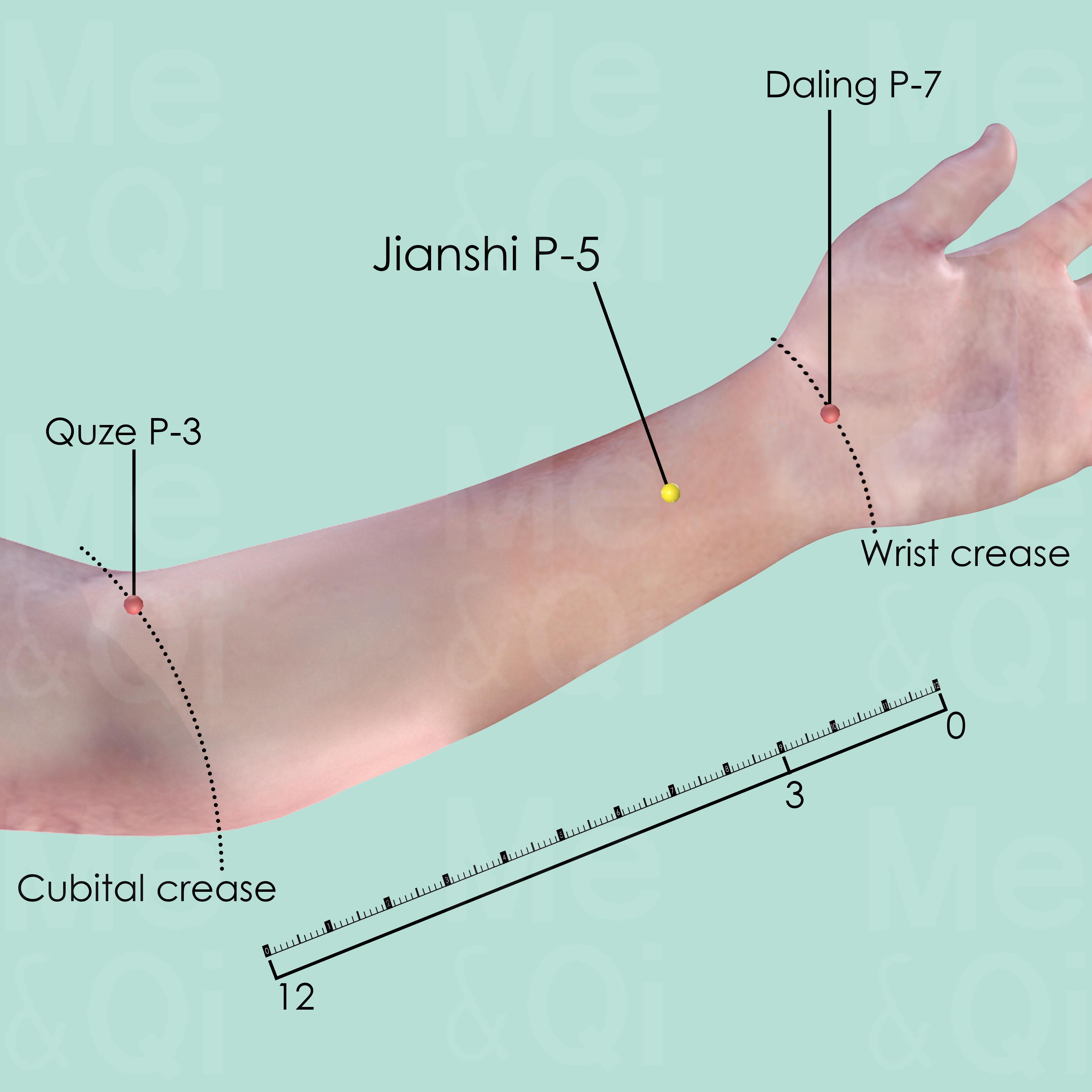
Jianshi P-5
3 cun above the transverse crease of the wrist, between the tendons of palmaris longus and flexor carpi radialis muscle.
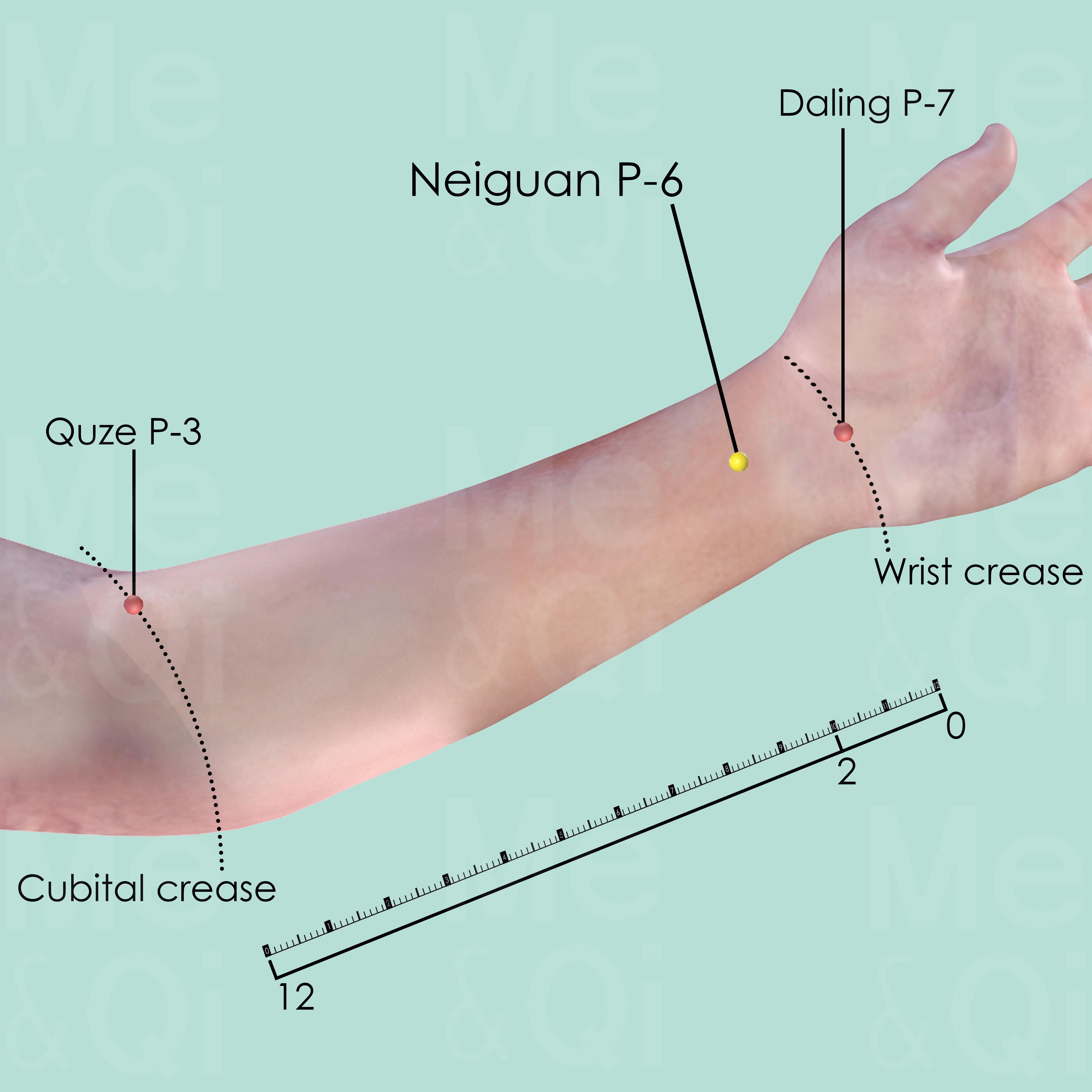
Neiguan P-6
2 cun above Daling P-7 on the transverse crease of the wrist, between the tendons of palmaris longus and flexor carpi radialis muscle.
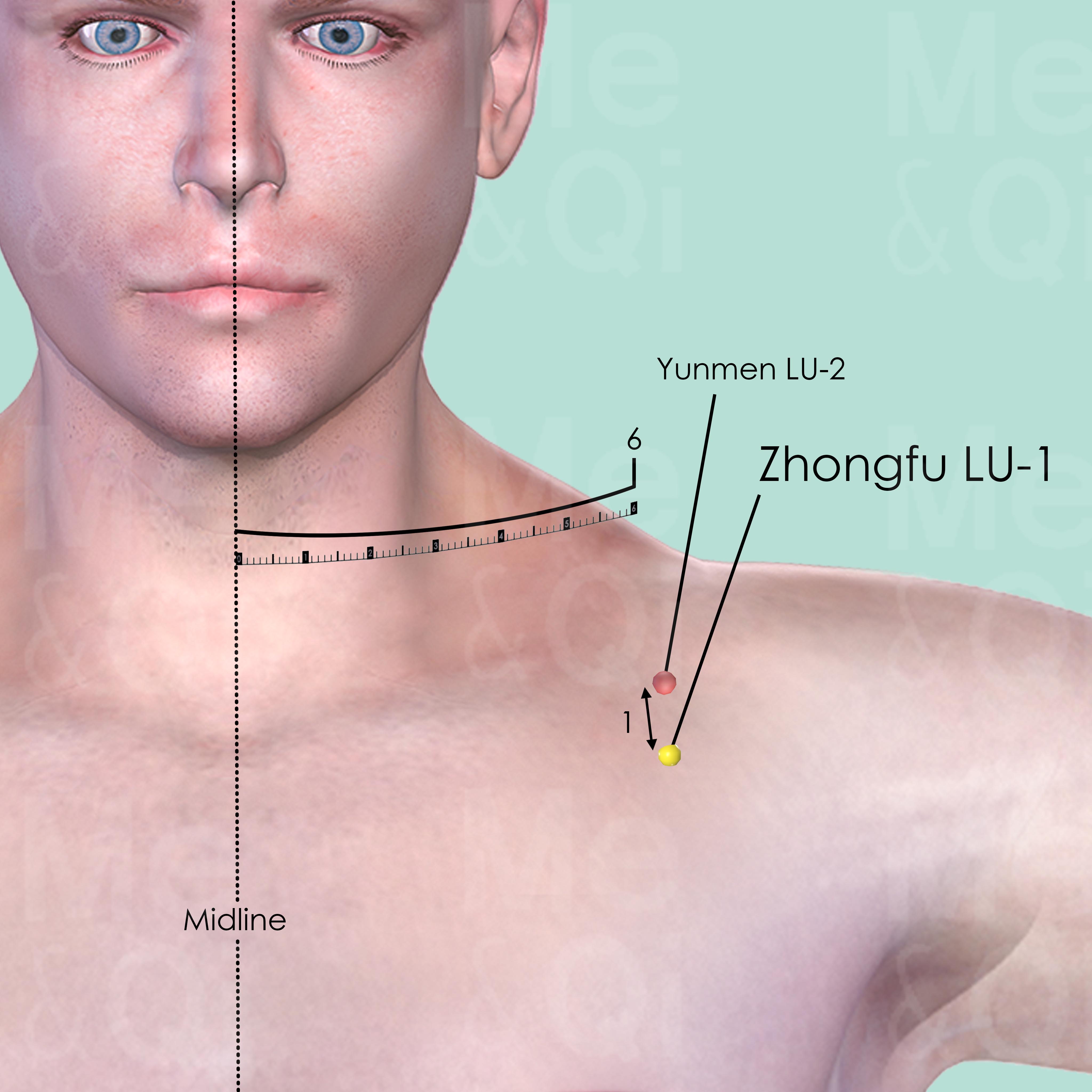
Zhongfu LU-1
On the lateral aspect of the chest, in the 1st intercostal space, 6 cun lateral to the midline, 1 cun inferior to Yunmen LU-2. Below the acromial extremity of the clavicle, slightly medial to the lower border of the coracoid process.
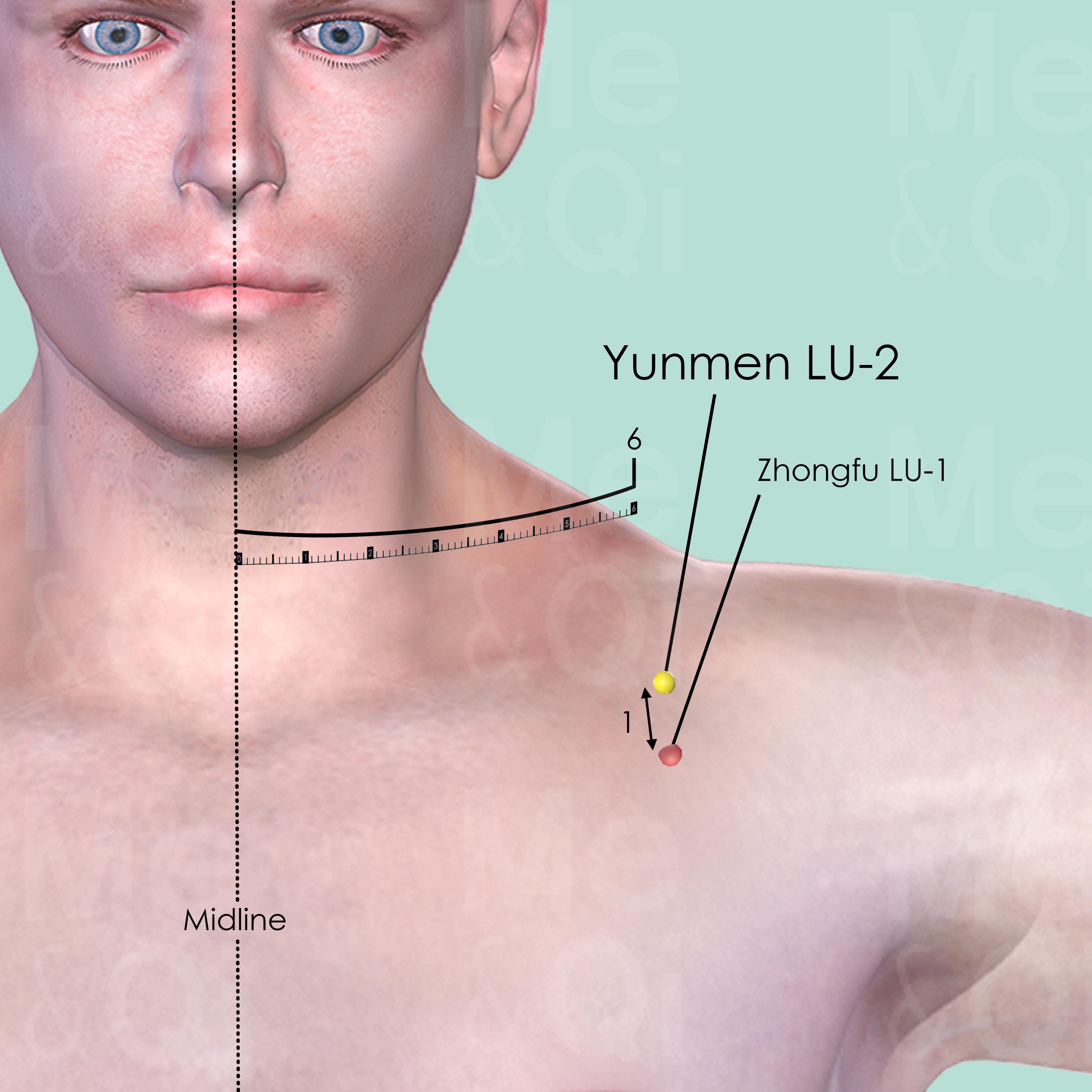
Yunmen LU-2
On the antero-lateral aspect of the chest, below the lateral extremity of the clavicle, about 6 cun lateral to the anterior midline in the centre of the deltopectoral triangle.
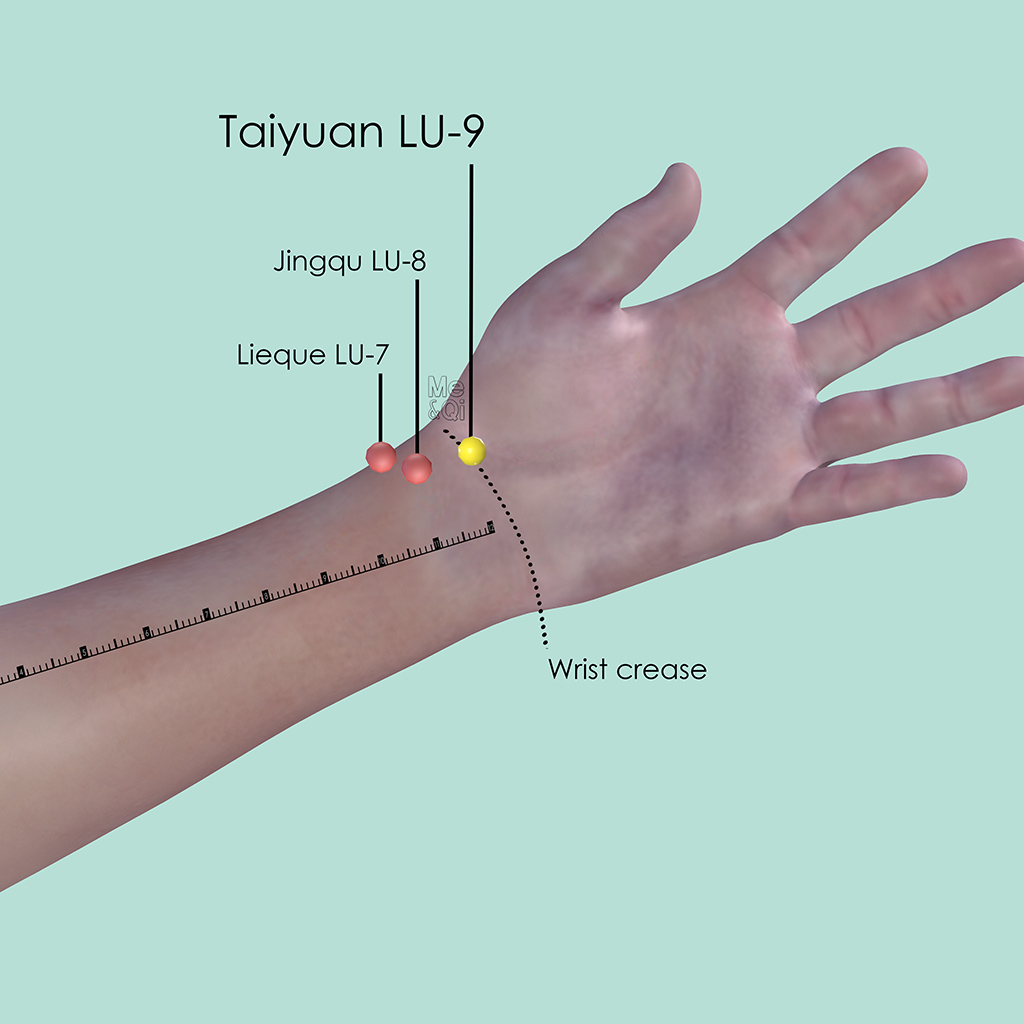
Taiyuan LU-9
At the wrist crease (wrist joint space), in the depression on the radial aspect of the radial artery and ulnar to the tendon of the abductor pollicis longus muscle.
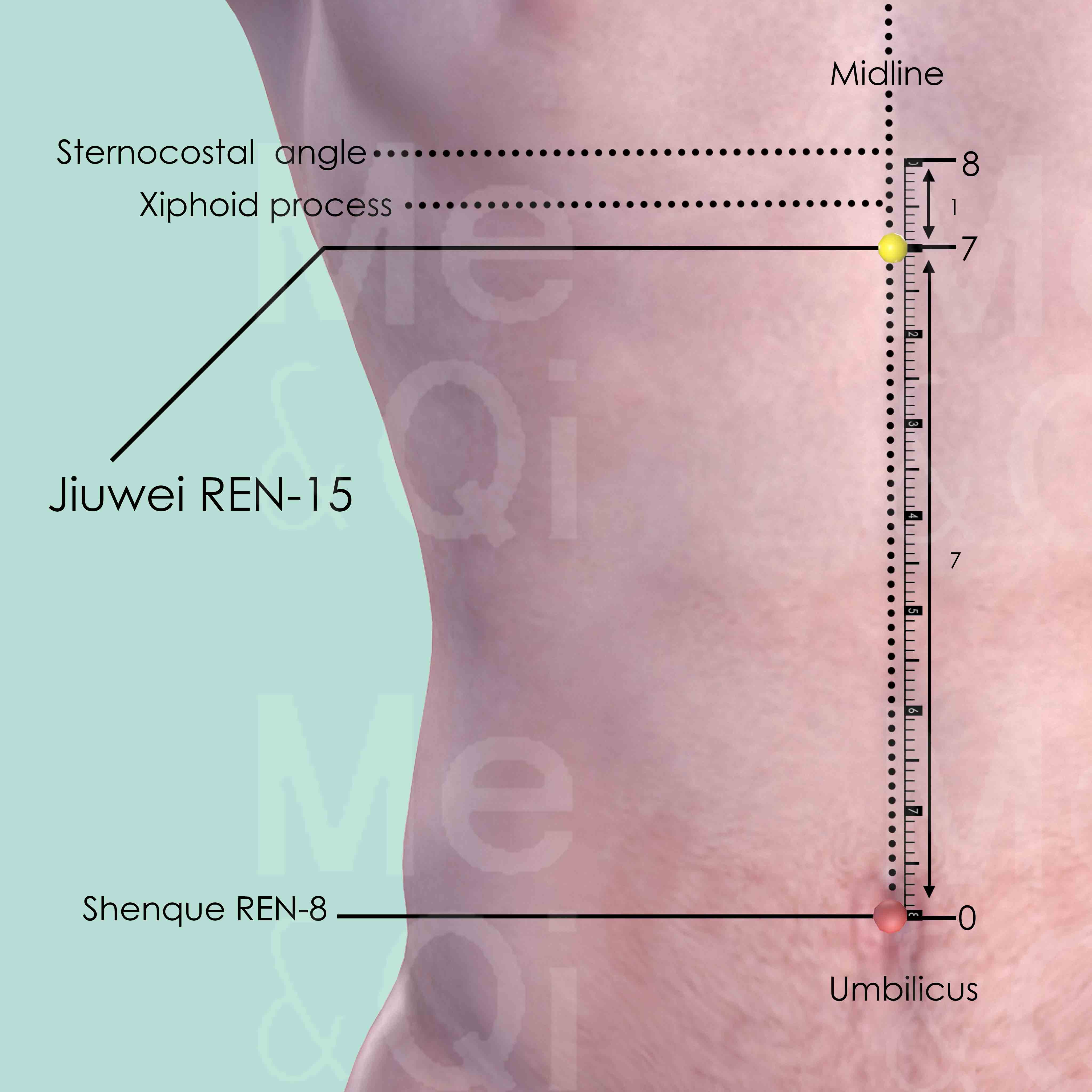
Jiuwei REN-15
On the midline of the abdomen, 7 cun above the umbilicus and 1 cun below the sternocostal angle. This point is located at the tip of the xiphoid process, which is commonly known as ‘dove-tail’ in China, hence the name of the point.
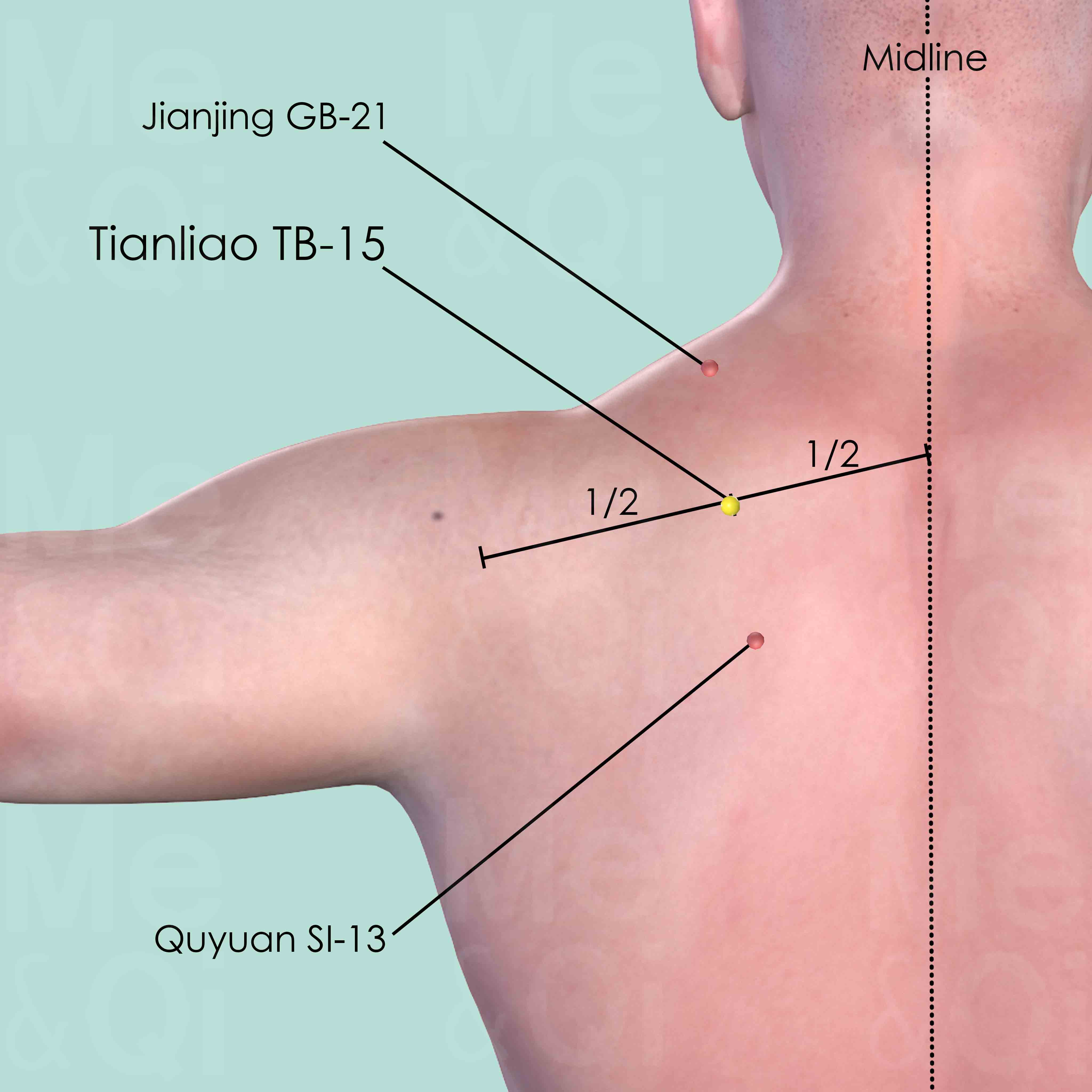
Tianliao TB-15
Midway between Jianjing GB-21 and Quyuan SI-13, on top of the superior angle of the scapula.
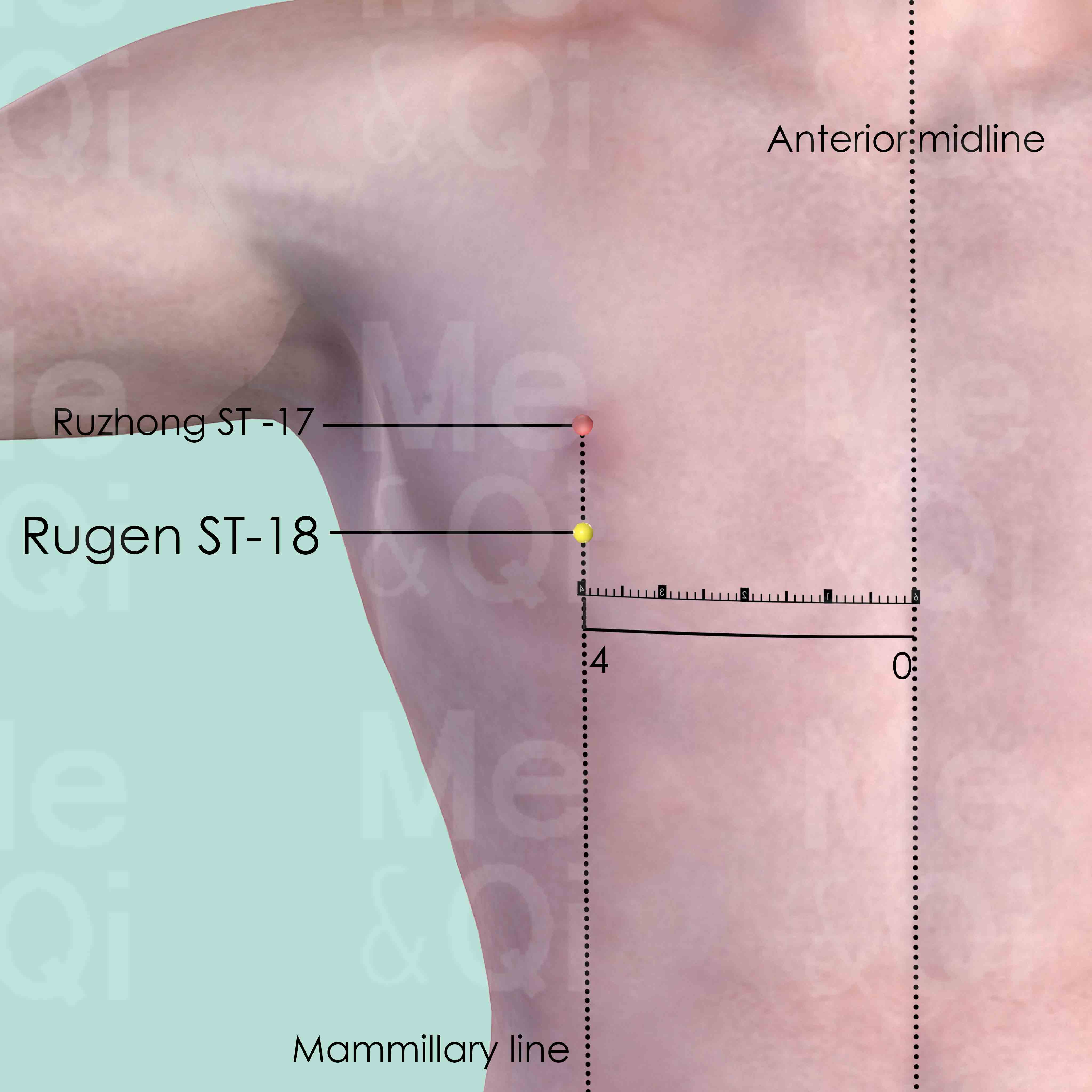
Rugen ST-18
In the 5nd intercostal space, on the mammillary line, 4 cun lateral to the anterior midline.
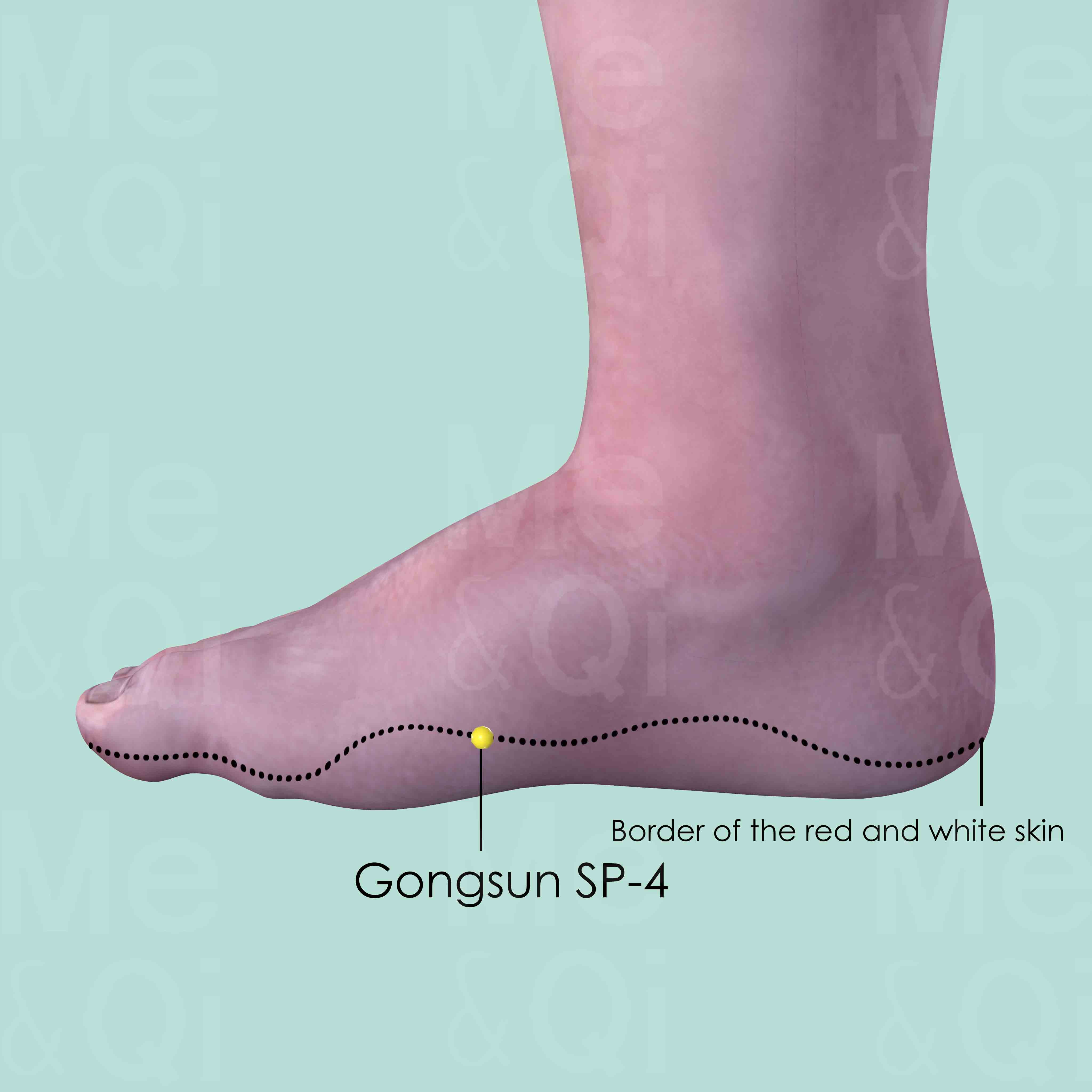
Gongsun SP-4
In the depression distal and inferior to the base of the 1st metatarsal bone, at the border of the red and white skin.

Shaoze SI-1
On the ulnar side of the little finger, about 0.1 cun posterior to the corner of the nail.

